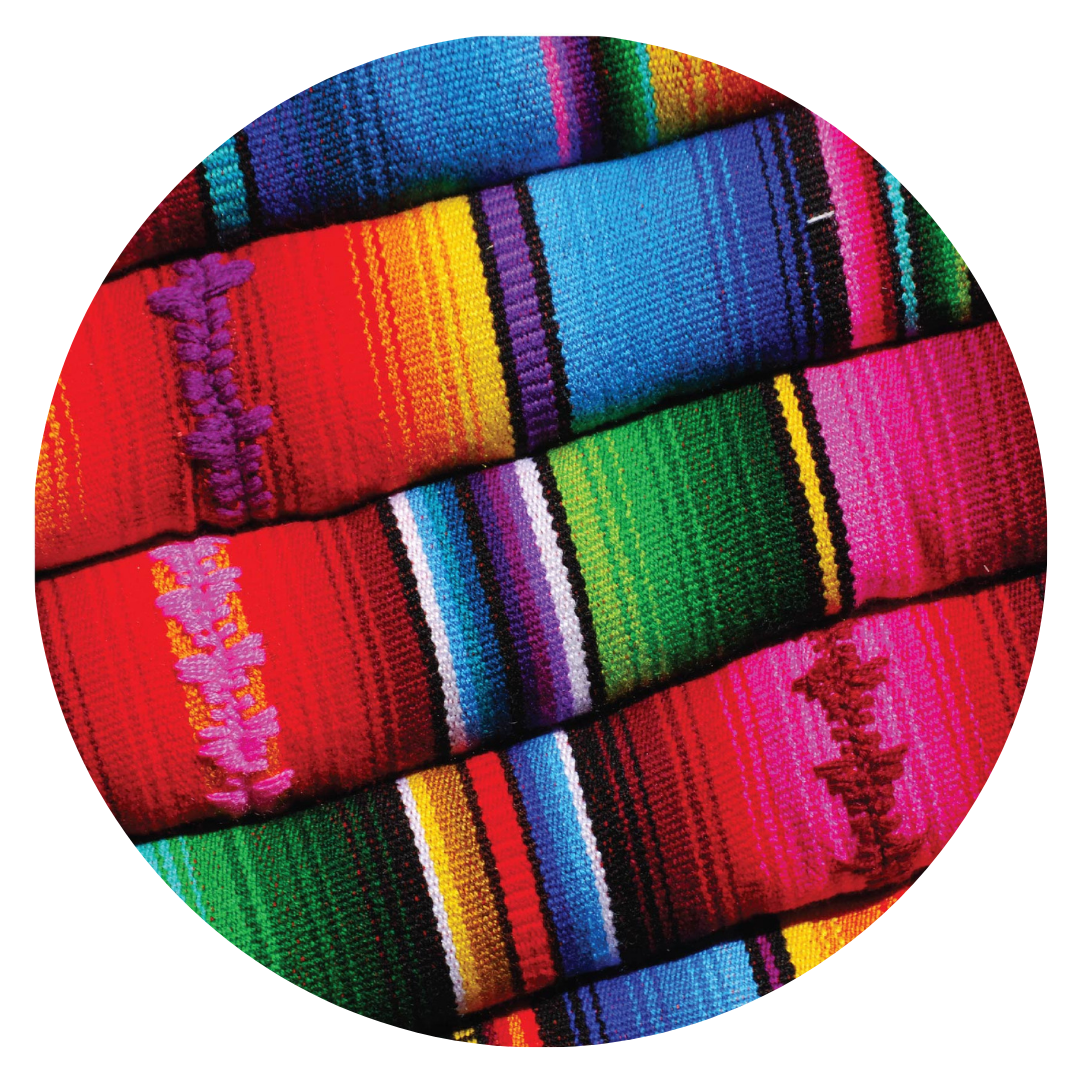Events Archives
January
Thursday, January 27, 2022 | 05:30 pm
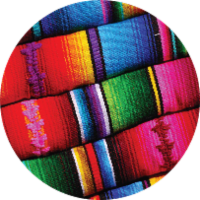
The Path to an International Non-Profit Career
Learn about amazing careers from those who paved the way! What are jobs you can have in the international non-profit sector? What steps can help you be a success now and in the future?
February
Monday, February 07, 2022 | 02:00 pm

Soil, Struggle and Justice: Agroecology in the Brazilian Landless Movement Film Screening & Discussion
Andreas Hernandez , UNM Sustainability Studies
This film examines a cooperative of the Brazilian Landless Movement (MST) in the South of Brazil, which struggled for access to land and then transitioned to ecological agriculture, or agroecology. This MST cooperative is demonstrating the possibility of an alternative model of flourishing rural life, which provides thriving livelihoods for farmers, produces high quality and low cost food for the region, and rehabilitates the earth.
Tuesday, February 15, 2022 | 02:30 pm
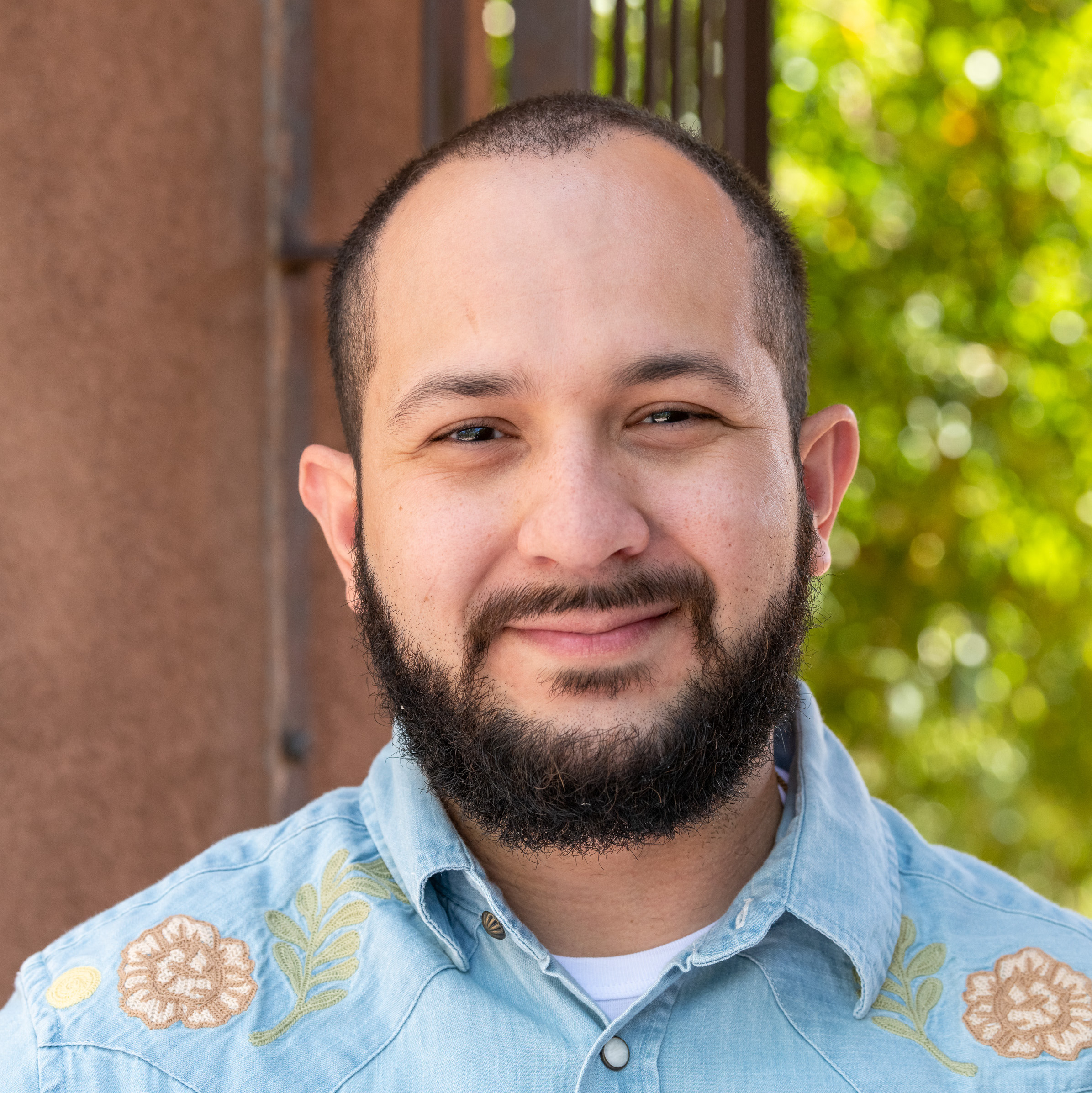
Forming La Opinión in Los Angeles: Ignacio Lozano, Mexicanidad, and Diasporic Nationalism, 1926-1940
Andy Rafael Aguilera
In October 1934, Ignacio Lozano Sr., newspaper mogul of Los Angeles’s La Opinión and San Antonio’s La Prensa, received an urgent telegram that his papers had been prohibited from crossing the Mexican border. That same day, his correspondent from Mexico City, José C. Valdés, confirmed to Lozano that his papers had had been marked as “seditious propaganda” by the Mexican government. Lozano subsequently denied these claims and pointed to Mexico’s guarantee of free press. In contrast to northward movement of Mexican people, resources, and ideas, the prohibition of Lozano’s newspapers represented a unique case on the U.S.-Mexico borderlands. This talk focuses on the formation of La Opinión in its first decade in which it utilized democratic rhetoric that emphasized the ideals of free press and electoral participation for Mexicans on both sides of the border. Lozano’s papers represented a transnational Mexican citizenship which relied on warning readers on the dangers of the Mexican government that spawned from the Mexican Revolution. La Opinión ultimately functioned as a crucial borderlands newspaper for ethnic Mexicans across the U.S. Southwest. The long Mexican Revolution thus contributed to the establishment of two seminal Mexican borderlands newspapers, and its efforts to keep the bonds of mexicanidad linked to the homeland from afar.
Wednesday, February 23, 2022 | 03:00 pm
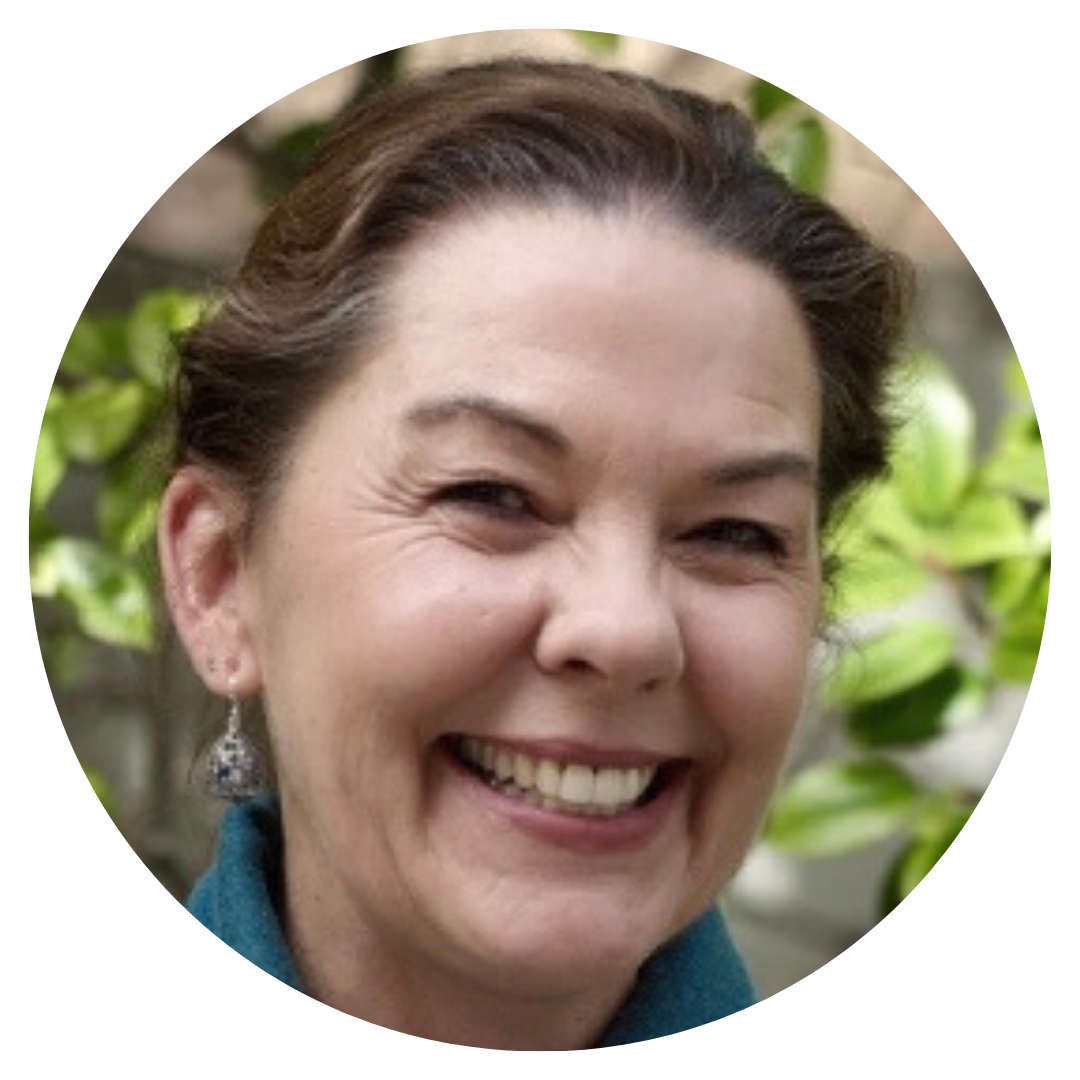
Immigration & Asylum
Dr. Kimberly Gauderman joined the History Department in 1998 and served as the Departmental Undergraduate Advisor for nine years (2009-20018). She served as Director of the UNM Latin American Studies Program for three years (2005-2008) and is currently a Faculty Affiliate of the UNM School of Law. She teaches a variety of courses focusing on early and modern Latin American history. Reflective of her research interests and her concern for social justice and human rights, she focuses on the construction of institutional authority in the early modern and modern periods in Iberia and Latin America and the creation of racial categories, gender norms, and sexual identities. She offers courses on early Mexico (including Central America), early South America, modern Central America and the Andean nations that include such themes as indigenous peoples, women, gender and sexuality, environment, human rights, gangs and criminal organizations, and governmental regimes and political corruption.
In-person in the Luminaria Room (SUB 3rd Floor--room capacity of 10)
or virtual
Zoom Meeting ID: 956 8592 7614
Passcode: PNMGC
Thursday, February 24, 2022 | 04:30 pm

Incorporating Global and Latin American Sounds into the Classroom
The first part of this workshop will feature a special presentation - "Living and Learning through Sound: Developing a Sonic Epistemology". Drawing from her recent fieldwork in Costa Rica, Dr. Ana Alonso Minutti will address ways in which artists and scientists associated with the Universidad de Costa Rica, in conjunction with local activists, have developed the workbook ¡Escuchá conmigo! (2021), an invitation for kids and young adults to engage in an exercise of listening through the body to connect with nature. Having grown up in Mexico, she will address a similar project developed in her home country, Suena Mexico (2016), an illustrated book that tells a story using the yells and calls of street public services (el gas, la basura, tamales, etc.). Taking these two book projects as case examples, she will propose ways in which teachers and students can think through sound and engage in creative exercises to promote human and nonhuman connections.
An active hiker, Ana will introduce the practice of soundwalking as yet another way of developing a sonic epistemology. By sharing her recent experience walking over 80 kms of El Camino de Santiago (Spain), she will propose doing soundwalks to create harmony between body, mind, and soul by listening through walking. Lastly, drawing from her time living in Albuquerque for the past eight years, Ana will address the ways in which the unique New Mexican soundscape has been a catalyst for her research, teaching, and composing.
Ana Alonso Minutti is a music scholar, pedagogue, writer, and occasional composer based in Albuquerque, NM. She is passionate about listening, learning, loving, and living. Currently, she’s spending her sabbatical in Spanish-speaking lands, as she had missed thinking and speaking solely in her native language.
Following Ana's presentation, participants will further explore how to incorporate sound into their classroom teaching. What does the world sound like? What does Latin America sound like? How is sound a form of resistance and sovereignty? Listen to soundscapes from around Latin America and Iberia, participate in an "ear opening" activity using South American sounds, and learn what resources are available to help you incorporate sound - including music, oral history, and podcasts - into your classroom. The resources provided are applicable across grade levels, languages, and subject areas. An educator book guide on "Hungry Listening" will also be provided and discussed.
Explore, listen, and open your ears in this hands-on virtual workshop.
Friday, February 25, 2022 | 03:00 pm
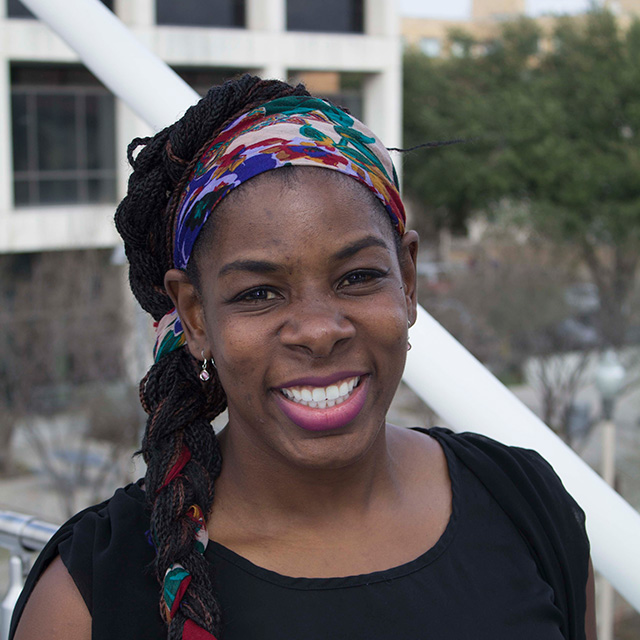
A Black Feminist Toolkit: Mobilization and Cohesion in Emergent Race-based Social Movements
Dr. Prisca Gayles , University of Nevada, Reno
Social movements scholars have considered the role of individual and collective emotions in mobilization and cohesion but have not engaged with racialized emotions in this literature. In this presentation, Prisca Gayles examines Black women’s increased participation in Argentina’s black and feminist social movements, as evidenced by their visibility at recent major protest events. Gayles investigates why Black women’s membership is growing faster than in previous years, and how movement participants utilize transnational black feminisms to empower new members. Drawing on twenty-two months of ethnographic fieldwork, Gayles examines how negative and positive emotional bonds function as tools of mobilization in race-based social movements. Gayles argues that Black women activists equip their constituency with a “black feminist toolkit,” giving them skills to process and confront the otherwise crippling forms of quotidian and institutional racism they suffer through. Their findings show why and how affective processes of mobilization are critical to Black women’s activism in Argentina.
March
Thursday, March 03, 2022 | 02:00 pm
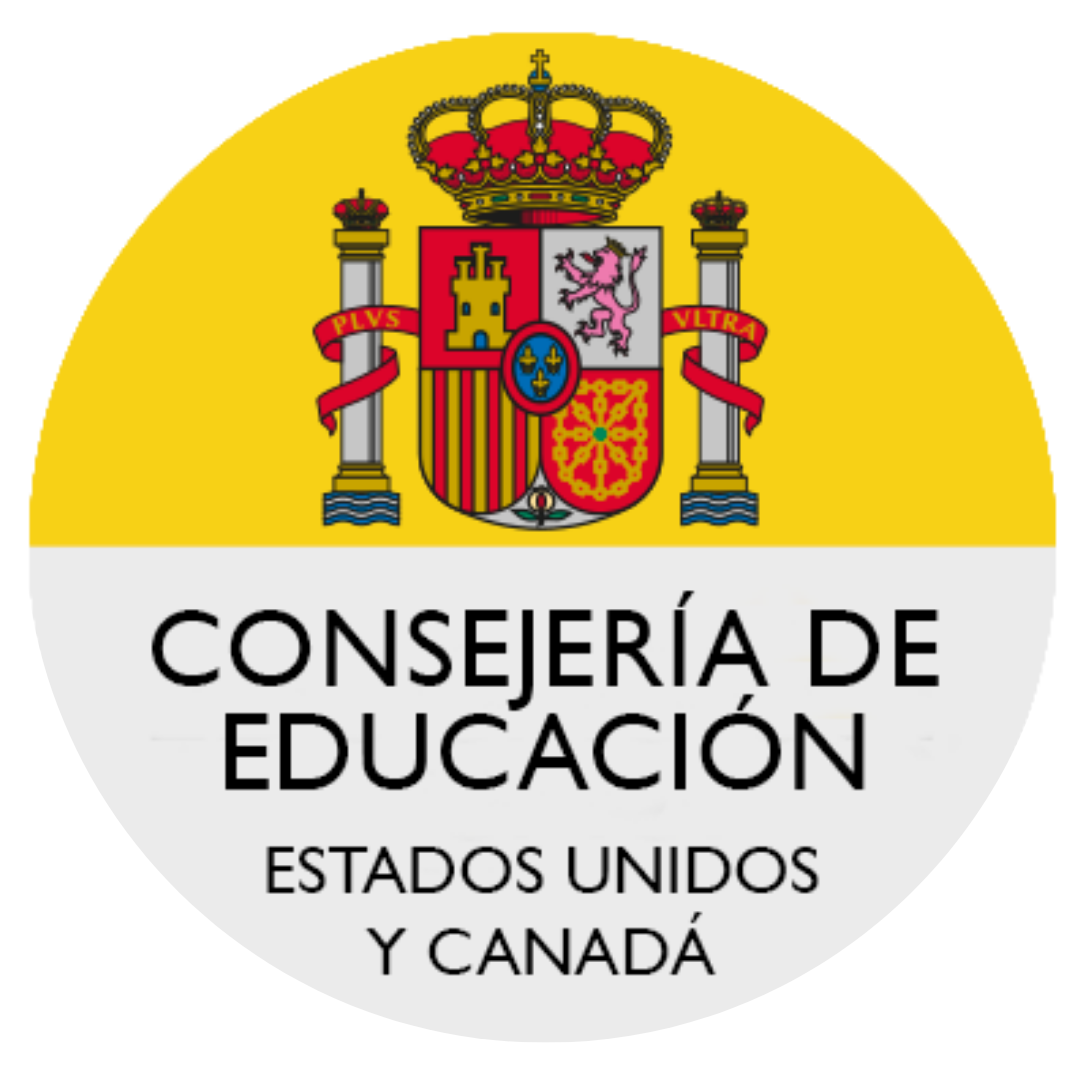
North American Language Assistants Program: Cultural Ambassadors Program Info Session
The Education Office of the Embassy of Spain promotes diverse educational outreach programs in the United States. Located in Washington D.C., the primary goal of the Education Office of Spain is to foster collaborative educational programs between the USA and Spain, building long lasting ties among their citizens.
Our flagship program, both in number and scope is the North American Language and Culture Assistants Program (NALCAP). American college students and graduates- who are native-like speakers of English - partner with elementary and secondary schools in Spain to bolster language programs, as language assistants (TAs) under the supervision and guidance of teachers in Spain.
NALCAP falls under the category of public diplomacy programs. As a language assistant, you will be fulfilling the role of a cultural ambassador as you advance English language learning and mutual understanding through cultural exchange. As such, your role is to encourage students of all ages in Spain to broaden their knowledge of your language and culture.
Join this info session to learn more!
Monday, March 07, 2022 | 05:00 pm
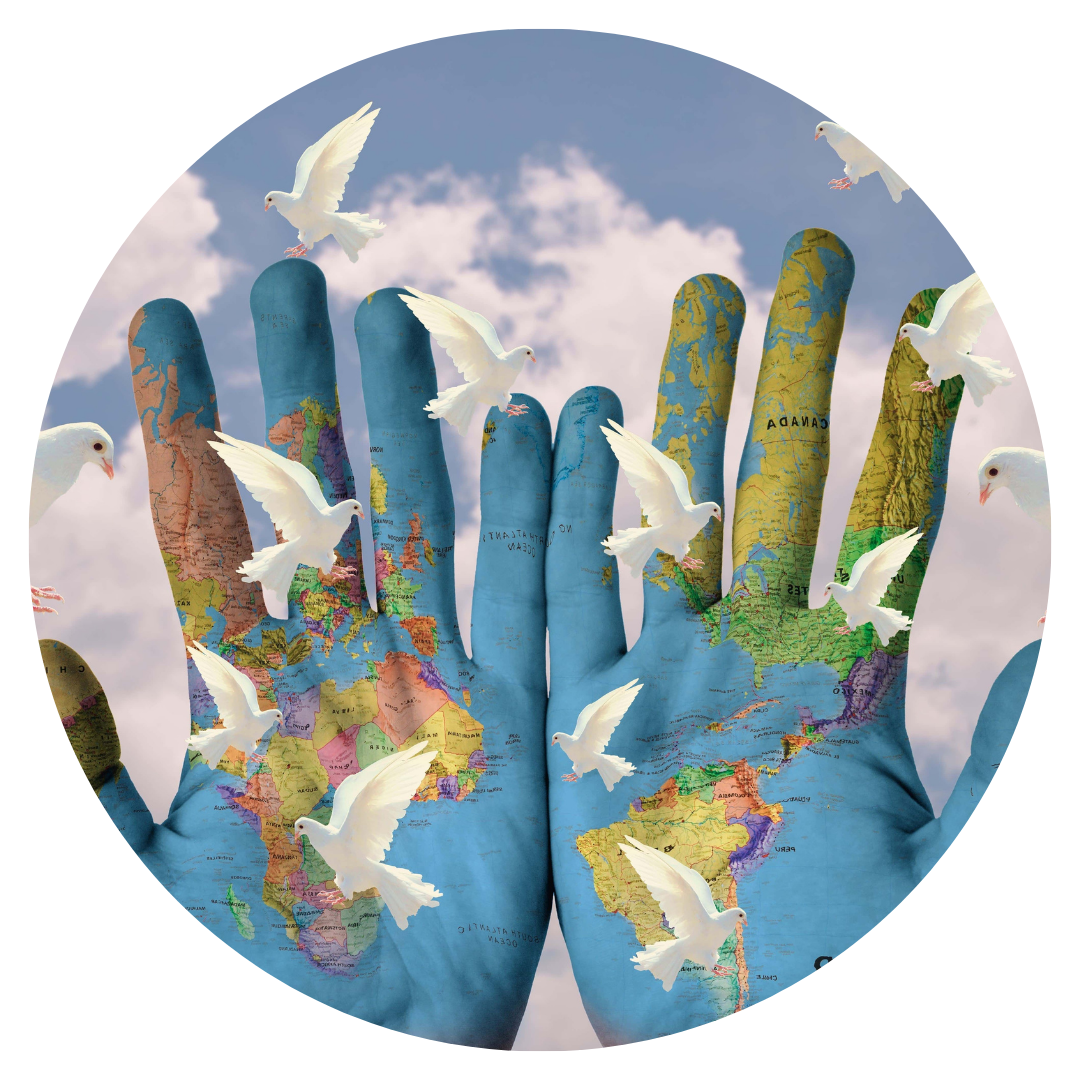
Working in International Business in New Mexico: Breaking Into the Sector, What Opportunities Exist and What Does Career Growth Look?
Yuri Morales and Celeste Nuñez
This panel will inform UNM students of career opportunities in the International Business Sector within New Mexico. It will inform them on how to break into the sector and what this career looks like in practice.
Yuri Morales currently works as the Executive Director of Global Ties ABQ. Prior to that role, she was the International Markets and Tourism Director at the Albuquerque Hispano Chamber of Commerce’ Convention & Tourism Department. Yuri was born and raised in Cuernavaca, Morelos, Mexico and has lived in Albuquerque since 2006. Yuri earned a bachelor’s degree focusing on International Affairs from the Universidad Internacional (UNINTER) located in Cuernavaca, Morelos, Mexico. She arrived in Albuquerque as an International Student and earned her master’s degree in Public Administration from the University of New Mexico. She currently serves as a member on several different boards. The Albuquerque Balloon Museum Foundation allows her the opportunity to keep showcasing the beauty of our city to international visitors. She is a Founding Director and Vice President for Government Affairs to the US-Mexico & Latin America Chamber of Commerce. She sits on the eVOLV Strong Corporate Board promoting health and wellness in the US and Mexico and is the current Vice President of the Cottonwood Classical Preparatory School Governing Council. Most recently, Yuri was an award recipient of 2021 New Mexico's Top 40 Under Forty by the Albuquerque Business First.
Celeste Nuñez is the Director of International Business Resources for the New Mexico Trade Alliance, a nonprofit economic development organization in Albuquerque, New Mexico. She connects companies from all over New Mexico with local, state, federal, and international export assistance resources to help them gain and grow international sales. Notably, Celeste manages the SBA-funded New Mexico State Trade Expansion Program Grant under the New Mexico Trade Alliance’s contract with the State of New Mexico. In 2019, Celeste served as the organizer for the Albuquerque - Chihuahua Sister City Bilateral Commission, an agreement with an objective to develop programs of mutual benefit to meet common needs and promote cooperation in the areas of economic development, tourism and cultural exchange, public safety, and education. As the commission organizer, she facilitated collaboration among the worktables and managed a 20 member outbound mayoral delegation and inbound Chihuahua municipal government delegation for the first commission accord signing. Celeste is a member of the 2020 U.S. Global Leadership Coalition's Next Gen Global Leaders Network, a class of nearly 100 young professionals across the country championing global development and diplomacy. She now currently sits as a member of the USGLC New Mexico Advisory Board. Celeste recently took on the role as Chair of the Albuquerque – Guadalajara Sister City relationship. Additionally, Celeste contracts with local governments on other business development projects through her own consulting company. Celeste graduated summa cum laude with a BBA from the University of New Mexico’s Anderson School of Management focusing on International Management and Marketing. Celeste is a first generation business professional with a passion for creating economic opportunity in her state.
Tuesday, March 08, 2022 | 03:00 pm

Vengeance, Power and Dior: How Frida Kahlo, Evita Peron and Carmen Miranda Used Beauty Work to Become Immortal
Elizabeth Gackstetter Nichols
Frida Kahlo, Evita Peron, and Carmen Miranda are icons of beauty, power, and influence in the Americas. Living in the same post-war moment, each used the power of their appearance to gain both personal and political goals. In this talk I'll discuss my book-in-progress, a work that tells the story of how each of these women intentionally and deliberately leveraged their beauty, and their beauty work, to find success against the odds, and against a wide array of societal pressures.
Dr. Elizabeth Gackstetter Nichols is a Professor of Spanish and Gender Studies at Drury University. She specializes in the area of Women and Gender Studies with current research interests in Latin American and International Beauty Practices, Cosplay, and Popular Culture. Dr. Nichols is the author of a variety of books, articles and encyclopedia entries in her research fields, including Popular Culture in Latin America and the Caribbean, Beauty, Virtue, Honor, and Success in Venezuela 1850-2015, and Beauty Around the World: A Cultural Encyclopedia. Dr. Nichols’ current investigations focus on the beauty work of women such as Evita Perón, Carmen Miranda, and Frida Kahlo as well as the international practice of cosplay in the Americas. She is a cosplayer herself, a cosplay mom, and an advocate for fan-led artistic creativity. She blogs at www.cosplaymom.com.
Tuesday, March 08, 2022 | 04:30 pm

Foreign Language and Area Studies (FLAS) Information Session
FLAS Fellowships provide tuition support and stipend to undergraduate and graduate students to study foreign languages in combination with area studies or international aspects of professional studies. Pending approval from the US/Department of Education, FLAS awards for the 2022-2023 academic year may be available to UNM students for the study of Portuguese, Quechua, Nahuatl, and Yucatec Maya. Join the information session to learn more about fellowship eligibility, requirements, and application process. These awards are funded under the provisions of Title VI of the Higher Education Act, and we may not know about funding availability for 2022-2023 until the end of summer. If LAII is awarded Title VI funds, we will be able to offer FLAS fellowships that provide $20,000 stipend plus up to $18,000 in tuition and fees for graduate students and $5,000 stipend plus up to $10,000 in tuition and fees for undergraduate students. These awards are only available to US citizens, nationals, and permanent residents. Undergraduate students must be at least at the intermediate level (second year) of a language to be eligible to apply. Graduate students may apply for beginning level (first year) of a language but must have advanced level knowledge of another Latin American language (usually Spanish) to receive the FLAS at this level. Applications will be due on Friday, April 1, 2022. For more information, please contact Associate Director for Program Development, Lenny A. Ureña Valerio, at lurena@unm.edu.
Thursday, March 10, 2022 | 01:00 pm
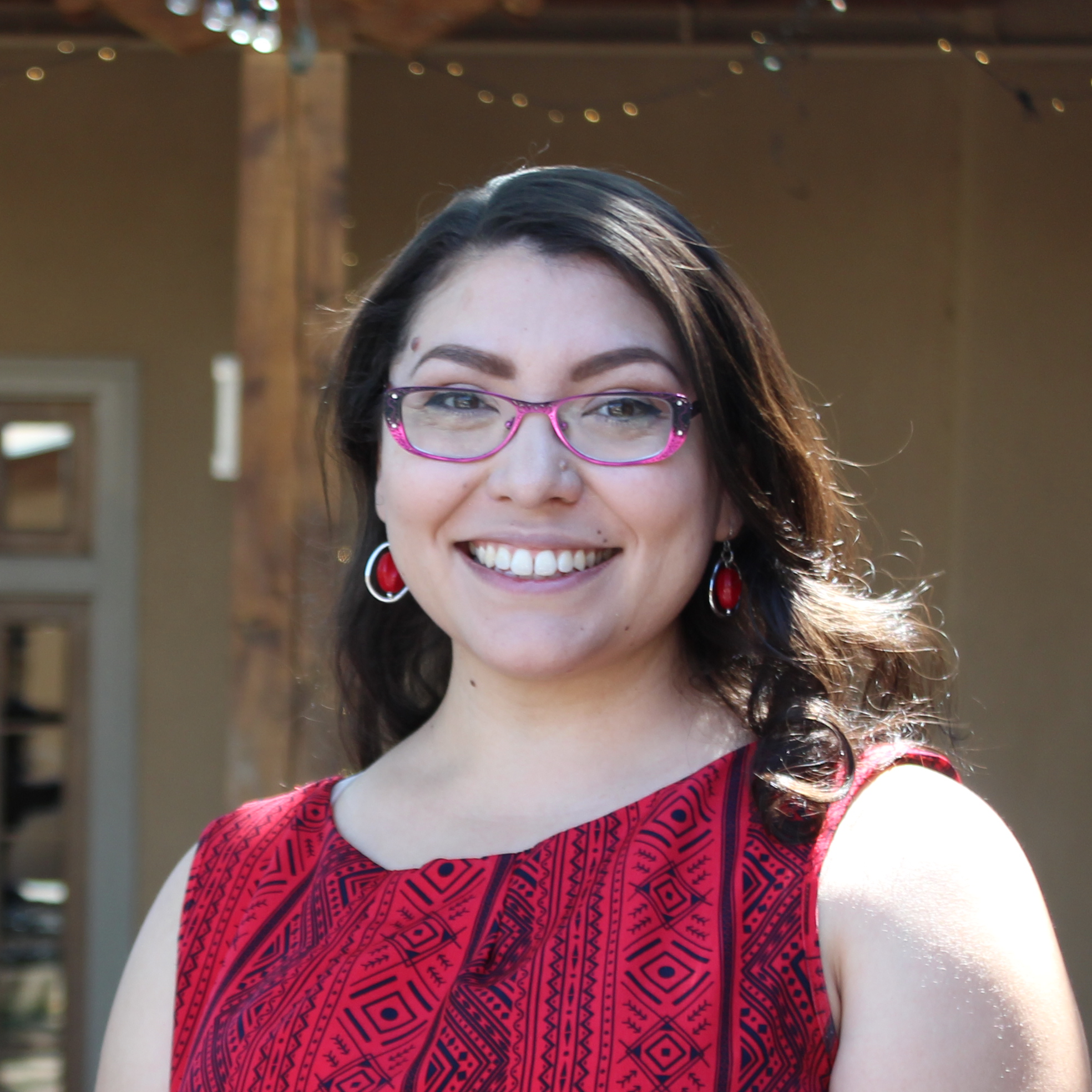
Representations of Resistance to State-Sanctioned Violence at the U.S.-Mexico Borderlands in Literature, Art, and Film
Laura Belmonte , Chicana and Chicano Studies
In this presentation, Dr. Belmonte will explore the cultural production by writers and artists who have sought to dignify the inhabitants, wildlife, and landscape of U.S.-Mexico borderlands through social activism, art, literature, and cultural practices. This presentation will explore Chicana, Chicano, and Mexican literature, art, and film produced by writers and authors that are themselves inhabitants of the U.S.-Mexico borderlands. The question at the center of Dr. Belmonte’s study is: what kinds of violence do the United States and Mexican nation-states endorse, permit, and even perpetuate in the U.S.-Mexico borderlands? She will present various types of violence represented in border literature and cultural production, and how we can denounce border violence in the 21st century.
Monday, March 21, 2022 | 04:00 pm
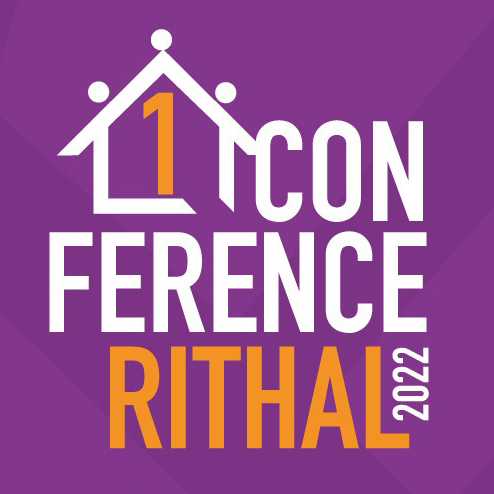
"Mary's Leading the Charge" - Red de Investigación sobre Trabajo del Hogar en América Latina (RITHAL)
This event will focus on the state of the art of research and activism in relation to domestic work in the 21st century among three leading researchers in the study of domestic service in the Americas. The "three Marias" are Mary Romero, author of Maid in the USA and President of the American Sociological Association; Mary Goldsmith, UAM researcher and scholar-activist in Mexico City; and Mary Garcia Castro, eminent Brazilian sociologist and co-editor of the landmark volume Muchachas No More (1985), a text that has influenced research and activism to the present day. The panel will have English-Spanish and -Portuguese simultaneous translation.
Tuesday, March 22, 2022 | 03:00 pm

A Discovery of Visual Poetry: Reading UNM's Collection of Mexican and Chilean Comics and Zines
Elizabeth Gackstetter Nichols
Graphic novels, comics, and artistic zines have, for several decades, served as an outlet of marginalized or subaltern expression. Using both written and graphic texts, these publications- often handmade and non-commercial, offer a unique avenue of escape. As publications outside the academy, zines often don't receive the attention that they deserve. In this talk, I'll show and discuss the visual poetry to be found in the Center for Southwest Research's collection of Mexican and Chilean zines.
Dr. Elizabeth Gackstetter Nichols is a Professor of Spanish and Gender Studies at Drury University. She specializes in the area of Women and Gender Studies with current research interests in Latin American and International Beauty Practices, Cosplay, and Popular Culture. Dr. Nichols is the author of a variety of books, articles and encyclopedia entries in her research fields, including: Popular Culture in Latin America and the Caribbean, Beauty, Virtue, Honor, and Success in Venezuela 1850-2015, and Beauty Around the World: A Cultural Encyclopedia. Dr. Nichols’ current investigations focus on the beauty work of women such as Evita Perón, Carmen Miranda, and Frida Kahlo as well as the international practice of cosplay in the Americas. She is a cosplayer herself, a cosplay mom, and an advocate for fan-led artistic creativity. She blogs at www.cosplaymom.com.
Wednesday, March 23, 2022 | 02:30 pm

Fragments Reassembled: Conservation of the Maya Murals of San Bartolo, Guatemala
Angelyn Bass
In 2001, extraordinarily well preserved Maya murals were discovered at Las Pinturas, San Bartolo, Guatemala. Subsequent archaeological investigation revealed elaborate murals devoted to Maya mythology, complete with hieroglyphic texts--the first artworks combining figure and text--buried in successive architectural phases dating from ca. 400-100 B.C. In addition to the 15 meter-long Late Preclassic-period wall paintings still standing in Sub-1A, there were over 7,000 mural fragments from four separate painted chambers within the pyramid that were intentionally broken into fragments and cached by the Maya as they dismantled older architecture to make room for new construction. Conservation of the wall paintings has been a 20-year collaboration between an international team of conservators, archaeologists, engineers, materials scientists, excavators, epigraphers, and iconographers. In this presentation l will discuss the materials and methods used to conserve the in situ wall paintings, as well as the mural fragments now in the collection of the Museo Nacional de Arqueología y Etnología, Guatemala City. Our ultimate conservation goal was to maintain the artwork’s physical condition in ways that make space for new values and narratives to emerge.
Angelyn Bass is an architectural conservator specializing in the conservation of archaeological sites, with a focus on architectural features, finishes, and wall paintings. She is a Research Assistant Professor of Anthropology at the University of New Mexico, and has been a conservator with PARASBX Proyecto Regional Arqueológico San Bartolo-Xultun since 2002.
Thursday, March 24, 2022 | 04:00 pm

A PLÁTICA WITH DENISE CHÁVEZ: La Frontera: Real and Imagined
Plática, a Conversation with renowned author, activist, playwright and UNM alumna Denise Chávez, an event co-hosted by the UNM English Department and the Western Literature Association. Denise will read and discuss her current book project, The Ghost of Esequiel Hernández, a novel exploring the dark history of the U.S.-México border with its ever- present military presence that has tragically impacted his inhabitants and their way of life. The novel is set in Redford, Texas, formerly called El Polvo/The Dust, where eighteen-year-old goat herder, Esequiel Hernández, was killed by a U.S. Marine in 1997. Chávez’s maternal roots are in this remote and magical corner of Far West Texas. The novel explores familial dysfunction as well as the legacy of life on the Frontera, the liminal space that is the break between these worlds.
Friday, March 25, 2022 | 12:00 pm

International Opportunities after UNM
Are you interested in working, serving, and studying abroad after graduation? This panel will introduce various international opportunities including Peace Corps, Department of State, and Fulbright program.
Presenters:
Antoinette Hurtado, Diplomat in Residence Southwest, US Department of State
Hallie Brown, 2018-2020 Peace Corps participant to The Gambia
Kiyoko Simmons, US Fulbright Program Advisor, UNM Honors College
Monday, March 28, 2022 | 02:00 pm

Amazonian Cosmopolitans
Suzanne Oakdale
In this lecture Dr. Suzanne Oakdale will discuss her recent book, Amazonian Cosmopolitans, focused on two Brazilian indigenous leaders’ autobiographical accounts. This work is an attempt to appreciate a distinctive form of historical consciousness, which, in keeping with broader lowland patterns, is focused on bodily states. She also connects these leaders’ small Amazonian group (the Tupian-speaking Kawaiwete) to national and world events. Both men provide unique perspectives on these as they played out in the Brazilian interior over the course of their lives, especially during the decades of the 1920s-60s. Moving beyond village-centered ethnography, Dr. Oakdale looks at how these men established long or short-term relationships with many non-Kawaiwete individuals and became part of different kinds of networks as the Brazilian interior became the target of “modern” state projects.
Suzanne Oakdale is a Professor in the Department of Anthropology at UNM. She has done ethnographic research in the Brazilian Amazon as well as historical research about this area since 1989. She has written on Kawaiwete (formerly known as Kayabi) ritual, and autobiographical narrative in I Foresee My Life: The Ritual Performance of Autobiography in an Amazonian Community published by 2005 by the University of Nebraska Press.
Tuesday, March 29, 2022 | 12:00 am
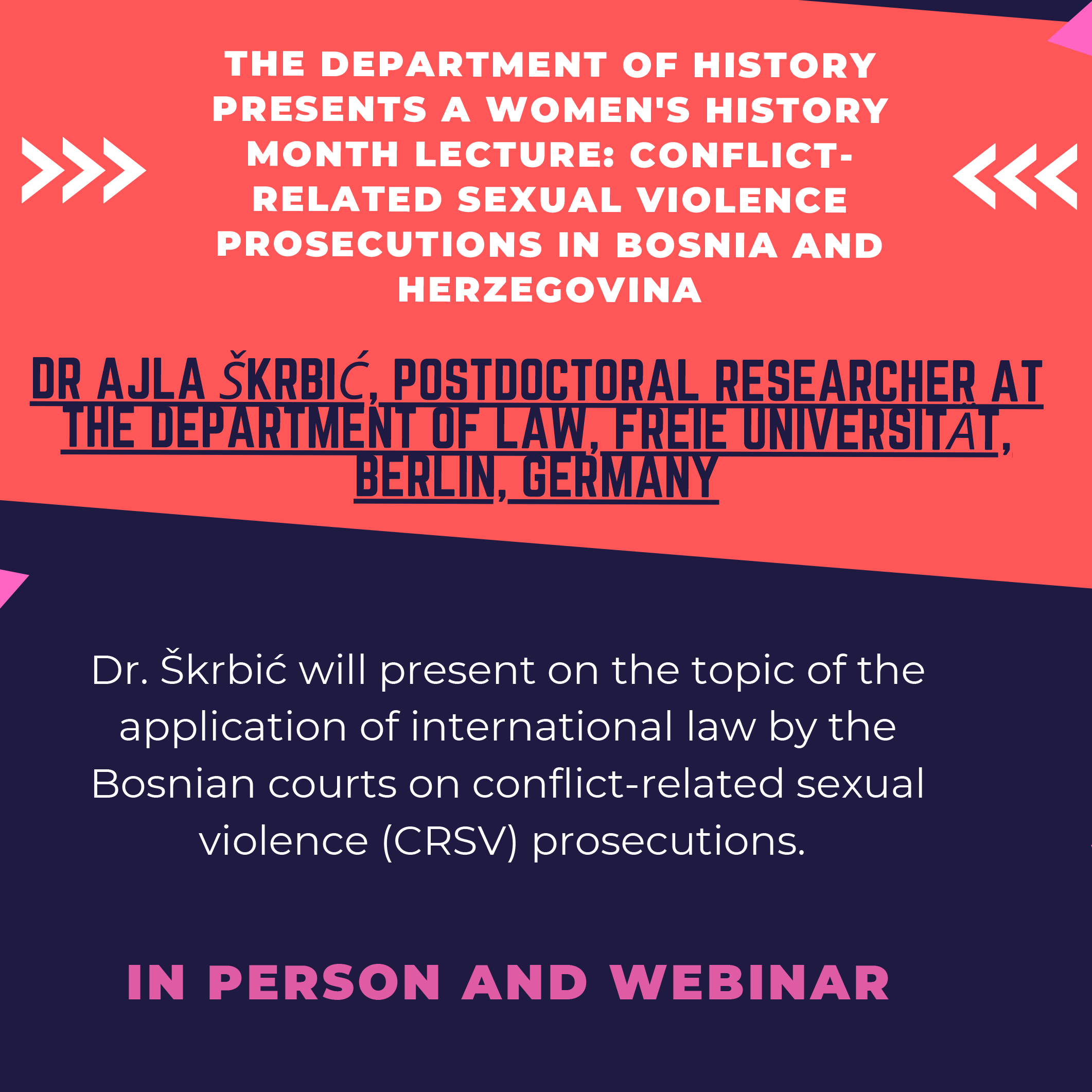
Conflict-Related Sexual Violence Prosecutions in Bosnia and Herzegovina
Dr Ajla Škrbić , Freie Universität
The Department of History presents a Women's History Month Lecture: Conflict-Related Sexual Violence Prosecutions in Bosnia and Herzegovina presented by Dr Ajla Škrbić, Postdoctoral researcher at the Department of Law, Freie Universität, Berlin, Germany. Dr. Škrbić will present on the topic of the application of international law by the Bosnian courts on conflict-related sexual violence (CRSV) prosecutions
Wednesday, March 30, 2022 | 03:00 pm

Juntas de Saneamiento in the Struggle for Water: The Catholic Church, The Peace Corps, and The World Bank-IDB in Rural Paraguay
Joseph García
The Peace Corps recently celebrated its 60th anniversary in 2021, with the Pandemic creating the conditions for the removal of volunteers worldwide and a big push to diversify the organization through an initiative to collect oral histories of volunteers. Chicana and Chicano Studies Adjunct Professor Joseph J. García was recognized for his service with the Peace Corps being featured in the "Many Faces of Peace Corps 60th Anniversary" video and Peace Corps Oral History Project. Coinciding with his current effort to publish his masters thesis. Dr. García will discuss his experience as a Chicano Peace Corps Volunteer during the time of major political strife and project work in Paraguay (1997-1999) and subsequent research on critical groundwater governance and development he was involved as a volunteer and graduate student at UNM. Dr. García will also discuss how his experience growing up in rural segregated south Texas and the voting rights activism/ organizing his parents led influenced his service, education, and trajectory.
Dr. Joseph García has a doctorate in Latin American Studies from the University of New Mexico and Dual-Degree Masters in Community and Regional Planning and Latin American Studies. He has taught at the University of New Mexico (Chicana and Chicano Studies), Union College (Latinx, Latin American and Caribbean Studies), and Texas A&M International University (history and sociology). His research focuses on the historical sociology of environmental justice movements and leadership in the Americas. He was a Peace Corps volunteer in rural Paraguay where he conducted post-service critical groundwater governance research. He is the son of voting rights organizers and has published on the history of voting rights and Latinx political participation and engagement in Texas. He has also taught at the secondary level and is currently a senior policy analyst with the NM Legislative Education Study Committee. https://chicanos.unm.edu/people/faculty/joseph_j_garcia.html
Thursday, March 31, 2022 | 04:30 pm
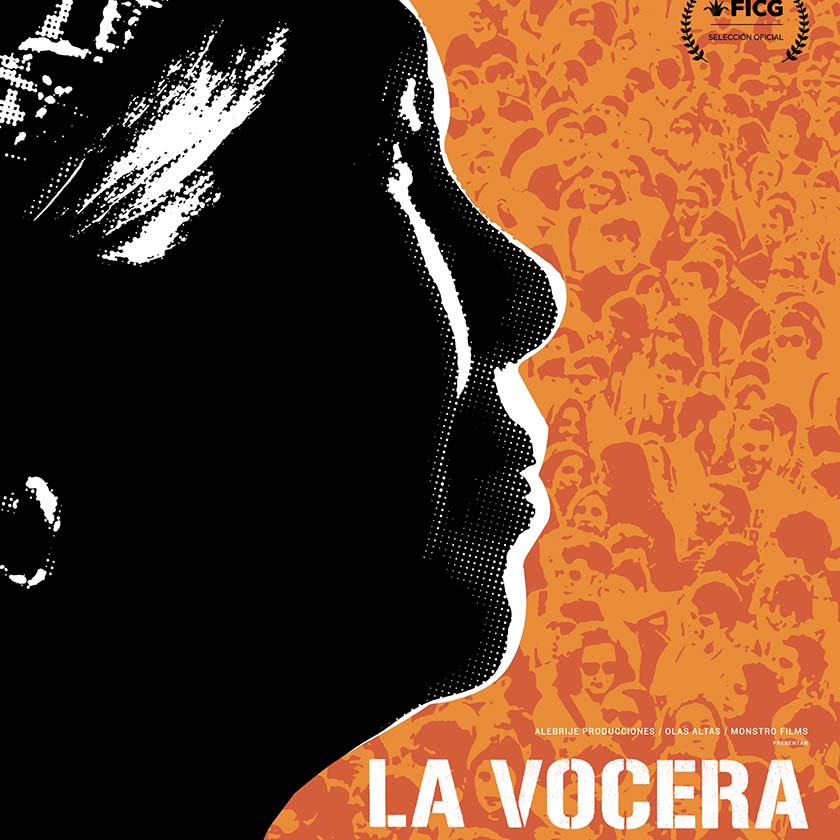
Indigenous Climate Resiliencies in Latin America: Teaching Climate Justice and Local Activism Through Documentary Film
The University of New Mexico’s Latin American & Iberian Institute (LAII) will be hosting a free professional development workshop for educators to explore how climate change impacts Latin American Indigenous communities, such as the Yaqui, Maya and Wixárika, through the documentary film La Vocera, directed by Luciana Kaplan. This unit focuses on a broader collective resistance of Indigenous peoples in Latin America and their leadership in the fight for climate justice. The resources presented include an entire unit on the documentary La Vocera, and two additional lesson plans - one of which encourages students to create their own documentary on climate justice and resiliency in their own communities. The resources presented at this workshop are targeted at middle school students, but can be applied to all classrooms with adaptation.
April
Tuesday, April 05, 2022 | 02:30 pm

Pious Imperialism: Spanish Rule and the Cult of Saints in Mexico City
Cory Conover , Augustana University
In this talk, Dr. Cory Conover draws from his book Pious Imperialism: Spanish rule and the cult of saints in Mexico City to shift through the contradictory claims about the role of Catholicism in the Spanish Empire over the long seventeenth century. Using the story of an accidental Mexican martyr, Conover weaves together a global history from missionaries in Japan, to politics of Rome, to the religious culture of Mexico City. An innovative focus on Catholic worship reveals the surprising pervasiveness of Spanish holy figures who disseminated imperialism to parishioners. It also shows how colonial peoples established themselves within the sanctity of Catholic liturgy thus setting a religious stage for later independence movements.
Thursday, April 07, 2022 | 01:00 pm
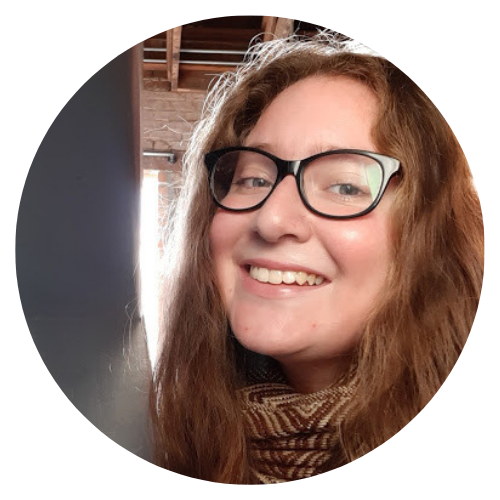
Research in Latin America During the Pandemic: How to Accept and Adapt to Changing Circumstances
Alejandra Acuña Balbuena
MALAS student Alejandra Acuña Balbuena will be presenting about the challenges she encountered during the COVID-19 pandemic to develop her research project on waste management issues in her home city of Asuncion, Paraguay. From external logistical challenges like traveling and conducting field research in person to internal issues that dealt with motivation, the pandemic made it seem like it would be impossible to complete a research project as the one she originally envisioned, largely based on day-to-day interactions with community members and facilitating group conversations as a research method. During this event, Acuña Balbuena will be focusing on how her research project was affected by the pandemic, how she adapted to changing global circumstances, and how she overcome personal and logistical challenges.
Born and raised in Paraguay, Alejandra Acuña Balbuena started her global education from a pretty young age. She left her country for the first time at 17 to finish high school in Norway. She then continued her undergraduate education in the United States, spending some time in between studying and living in Italy. She graduated with a dual degree in Environmental Sustainability and Italian in May 2020 from the University of Oklahoma and joined the Master in Latin American Studies at UNM in fall 2020, Her main academic interests include feminist geographies, urban political ecologies, and environmental injustice in urban environments. Her research focuses on discourses around the labor of urban waste pickers in her hometown of Asunción.
Thursday, April 07, 2022 | 02:00 pm

North American Language Assistants Program: Cultural Ambassadors Program Info Session
The Education Office of the Embassy of Spain promotes diverse educational outreach programs in the United States. Located in Washington D.C., the primary goal of the Education Office of Spain is to foster collaborative educational programs between the USA and Spain, building long lasting ties among their citizens.
Our flagship program, both in number and scope is the North American Language and Culture Assistants Program (NALCAP). American college students and graduates- who are native-like speakers of English - partner with elementary and secondary schools in Spain to bolster language programs, as language assistants (TAs) under the supervision and guidance of teachers in Spain.
NALCAP falls under the category of public diplomacy programs. As a language assistant, you will be fulfilling the role of a cultural ambassador as you advance English language learning and mutual understanding through cultural exchange. As such, your role is to encourage students of all ages in Spain to broaden their knowledge of your language and culture.
Join this info session to learn more!
Friday, April 08, 2022 | 12:00 pm

Translingual Literacy Studies Digital Hub :Democracy & Paradox
Ralph Cintron, Frida Sanchez-Vega, and Ruben Casas
Featured speakers Ralph Cintron, Frida Sanchez-Vega, and Ruben Casas will present their working paper “Democracy & Paradox” to engage current discourses about global challenges to democracy: authoritarianism, autocracy, climate change, and global migration of environmental refugees.
Friday, April 08, 2022 | 02:00 pm

Oaxaca Resurgent: a book panel on indigeneity, education, and development in the Americas
A. S. Dillingham, Albright College; Tiffany S. Lee, UNM; Yolanda Teran
A panel discussion on Dr. Shane Dillingham's recently-published book "Oaxaca Resurgent: Indigeneity, Development, and Inequality in Twentieth-Century Mexico". The panel will tackle the book's contributions to the field of Mexican history and indigenous studies, and elaborate on the broader hemispheric connections (North and South America) of such discussions.
A. S. Dillingham is a historian and professor. He is currently Assistant Professor of Latin American History at Albright College in Reading, Pennsylvania. Previously, Dillingham taught at Reed College in Portland, Oregon and Spring Hill College in Mobile, Alabama. He serves on the organizing collective of the Tepoztlán Institute for the Transnational History of the Americas. He holds a PhD in History from the University of Maryland. Dillingham’s research focuses on the historical experiences of Native peoples of the Americas. In particular, he focuses on twentieth-century Mexico, the intersection of anticolonial politics and educational and development policy, and labor and youth-led social movements.
Tiffany S. Lee (Diné /Lakota) is Dibé Łizhiní (Blacksheep) and born for Naałaní (Oglala Lakota). She is from Crystal, New Mexico, located on the Navajo Nation, on her mother’s side, and Pine Ridge, South Dakota on her father’s side. Dr. Lee is a Professor and Chair of Native American Studies at the University of New Mexico. She earned her doctorate in Sociology of Education from Stanford University. Her research examines Native youth perspectives with regard to language reclamation and identity. She also investigates socio-culturally centered educational approaches. She is the former President of the Navajo Studies Conference, Inc and a former high school social studies and language arts teacher at schools on the Navajo Nation and at Santa Fe Indian School. She is also a member of the New Mexico Indian Education Advisory Council for the NM Office of Indian Education.
Dr. Yolanda Teran is from the Indigenous Kichwa Nation of Ecuador. She was born in San Gabriel City in the north of Ecuador, South America. Since 1994 she has been an Indigenous representative for Latin America and the Caribbean before the United Nations. She holds B. A. in Museology from the Universidade do Rio de Janeiro in Brazil, an MA from the University of Leicester, England, and a PhD from UNM's College of Education with a concentration in Language, Literacy and Socio-Cultural Studies.
Wednesday, April 13, 2022 | 03:00 pm

"Kill the Indian to Save the Man" - Culturally and Linguistically Relevant Curriculum and the New Social Studies Standards in NM - (Martinez/Yazzie) Case
Joseph García
K-12 Education in New Mexico since the 2018 Martinez/Yazzie Decision is undergoing a major transition in terms of the historical neglect of Native American, English Language Learners and "At-Risk" students. As the politics of the U.S. has become divisive and Critical Race Theory has become a lightning rod issue in many states including NM. The NM Public Education Department is under pressure to at the same time show that the Martinez/Yazzie Decision is being implemented and after 20 years the social studies curriculum is being updated with culturally and linguistically relevant curriculum, part of the Martinez/Yazzie Decision. NMLESC Senior Policy Analyst and Chicanca and Chicano Studies Adjunct Professor Dr. Joseph J. García provides a brief overview and takes questions about this historical time in NM education history.
Dr. Joseph García has a doctorate in Latin American Studies from the University of New Mexico and Dual-Degree Masters in Community and Regional Planning and Latin American Studies. He has taught at the University of New Mexico (Chicana and Chicano Studies), Union College (Latinx, Latin American and Caribbean Studies), and Texas A&M International University (history and sociology). His research focuses on the historical sociology of environmental justice movements and leadership in the Americas. He was a Peace Corps volunteer in rural Paraguay where he conducted post-service critical groundwater governance research. He is the son of voting rights organizers and has published on the history of voting rights and Latinx political participation and engagement in Texas. He has also taught at the secondary level and is currently a senior policy analyst with the NM Legislative Education Study Committee. https://chicanos.unm.edu/people/faculty/joseph_j_garcia.html
Thursday, April 14, 2022 | 01:00 pm

Central American Women in the Workforce
Joselin Castillo
This talk addresses the transnational experience of Central American women in the workforce. With migration and gender at the center of the conversation, the presentation explores the ways Central American women laborers are perceived at local and international spaces. The research for this presentation is inspired by Castillo's experience raised by four Guatemalan women and as a first-generation Guatemalan American from Los Angeles. As the first in her family to enter the university, her talk will discuss how she entered the field of research, how she conceptualizes herself in her work, and reflects on the experiences of the Central American diaspora in relation to the larger Latin American region.
Joselin Castillo is a second-year MALAS student at UNM. She received a BA in Anthropology and a minor in Women, Gender and Sexuality at California State University, Los Angeles. Coming from a Guatemalan immigrant family and raised by a single mother, her research is focused on the experience of Central American mothering. Influenced by the caregivers in her life and the complex networks of communal caregiving, her research focuses on the intersectionality and transnational identity through the form of an autoethnography.
Sunday, April 17, 2022 | 03:00 pm
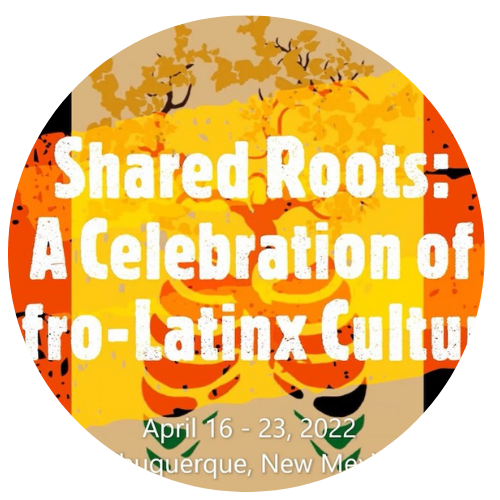
AfroMundo Festival: Shared Roots
Shared Roots is a weeklong series of bilingual presentations showcasing the shared histories, cultures and traditions of Afro peoples throughout the Americas.
Featured regions are Quisqueya (home of Haiti where the first successful slave rebellion occurred, and of the Dominican Republic, first Spanish colony in the Americas from where Hernan Cortes, Francisco Pizarro, Diego Velasquez and Alonso de Ojeda launched incursions into Mexico, Peru, Cuba, Venezuela), Mexico (which only last year included Afro-Mexicans in the census), Puerto Rico (a U.S. territory since 1898), and Spain (whose African influences are generally overlooked). Most events are free and open to the public.
Monday, April 18, 2022 | 12:30 pm
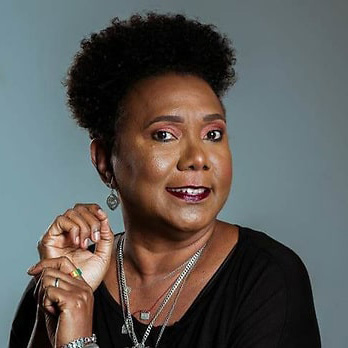
Cimarronaje y Arte en la República Dominicana: A Talk with Afro-Dominican Artist Xiomara Fortuna
Xiomara Fortuna
A singer, composer, and cultural activist recognized internationally as a foremost representative of alternative music and Afro-Caribbean fusion in the Dominican Republic, Fortuna will discuss the re-articulation of cimarronaje (cultural practices of runaway slaves) in artistic production as a defining feature of Afro-Dominican arts.
Monday, April 18, 2022 | 02:30 pm
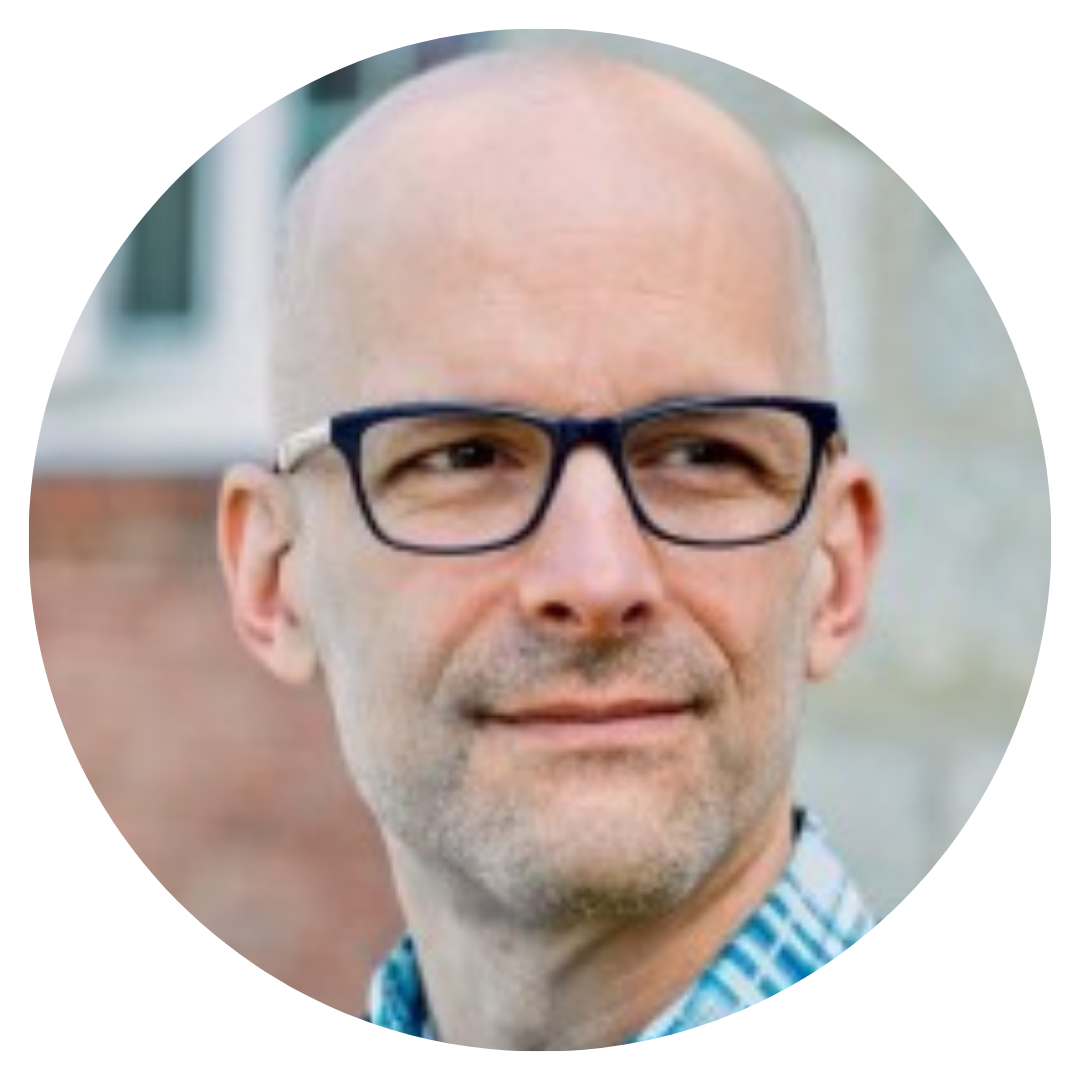
Family Made Strange: The Impact of Social Media on Family Dynamics, as a Classe Popular Family from Recife, Brazil Contemplates the 2018 Presidential Elections
Benjamin Junge , State University of New York at New Paltz
In this talk, Benjamin Junge will present an ethnographic account of an extended family from Recife during the final month of Brazil’s 2018 election season—the most contentious and polarizing election in a generation, in which hard-right congressman and former military captain Jair Bolsonaro triumphed to assume the presidency. The family exemplifies the sector once referred to as Brazil’s “new middle class”—the estimated 35 million who rose above the poverty line during 14 years of rule by the left-leaning Workers Party (PT), but whose prospects have since become precarious under conditions of economic and political crisis. Drawing from extended ethnographic fieldwork, I focus on the family’s interactions—both in-person and through online social media—between the first-round election (October 7), in which voters chose from over a dozen candidates, and the second-round election (October 28), which pitted Bolsonaro against PT candidate Fernando Haddad. Emerging within the family’s interactions are narratives of moral disintegration, nostalgia for Brazil’s 1964-1985 military dictatorship, lost masculinities, menacing sexualities, and various articulations of hope and despair for the future. I argue the crucial role of online social media (chiefly, Facebook and WhatsApp) in cultivating among family member conflicting feelings of unity and solidarity, on the one hand, and disenchantment and alienation on the other. This analysis contributes to a more nuanced account of the political affinities of Brazil’s “previously ascendant” sector during a moment of deepening economic precarity and political cynicism.
Benjamin Junge is Professor of Anthropology at the State University of New York at New Paltz. His research focuses on class mobility, political attitudes, gender, sexuality, health, and religion, with regional focus on Brazil and other settings in Latin America. His recent publications include Precarious Democracy: Ethnographies of Hope, Despair and Resistance in Brazil (2021) and Cynical Citizenship: Gender, Regionalism and Political Subjectivity in Porto Alegre, Brazil (2018). He recently co-directed a three-year investigation, funded by the National Science Foundation, of political subjectivities among the demographic sector once known as Brazil’s “new middle class,” focusing on perceptions of the 2013-18 crisis, cultural memory of authoritarian pasts, and the rise of popular conservativism.
Tuesday, April 19, 2022 | 01:00 pm

Decolonizing the Academy: A Lecture/Slide Presentation by Mayra Santos-Febres
Mayra Santos-Febres
A world renowned, award-winning Afro-Puerto Rican author of seminal novels, Dr. Santos-Febres will deconstruct hegemonic texts in Latin American and Hispanic Studies to facilitate a conversation about Afro Latinidad on a hemispheric level and illuminate the inclusive nature of the diasporic Black experience.
Wednesday, April 20, 2022 | 12:00 pm
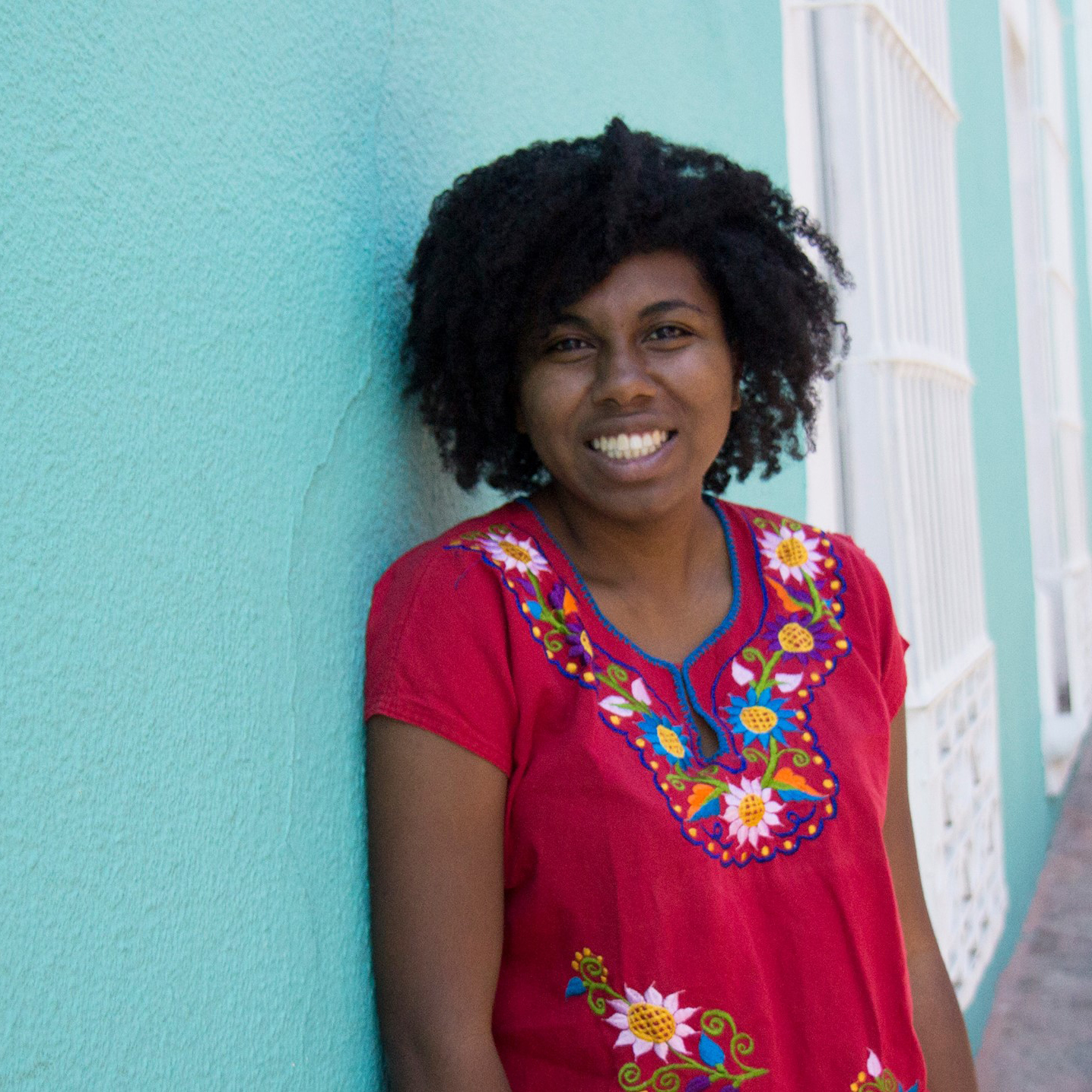
Afro Voices from the U.S./Mexico Border: A Film Screening and Discussion with Ebony Marie Bailey
Ebony Marie Bailey
An award-winning film creator, Bailey’s documentary Life Between Borders: Black Migrants in Mexico addresses the political, social, and environmental climate that have contributed to the displacement of Haitian migrants at the U.S.-Mexico border. It opens the discussion of Haitian-Mexican relations to illuminate how Blackness is understood, discriminated against, and embraced in Mexico’s borderlands.
Friday, April 22, 2022 | 05:15 pm
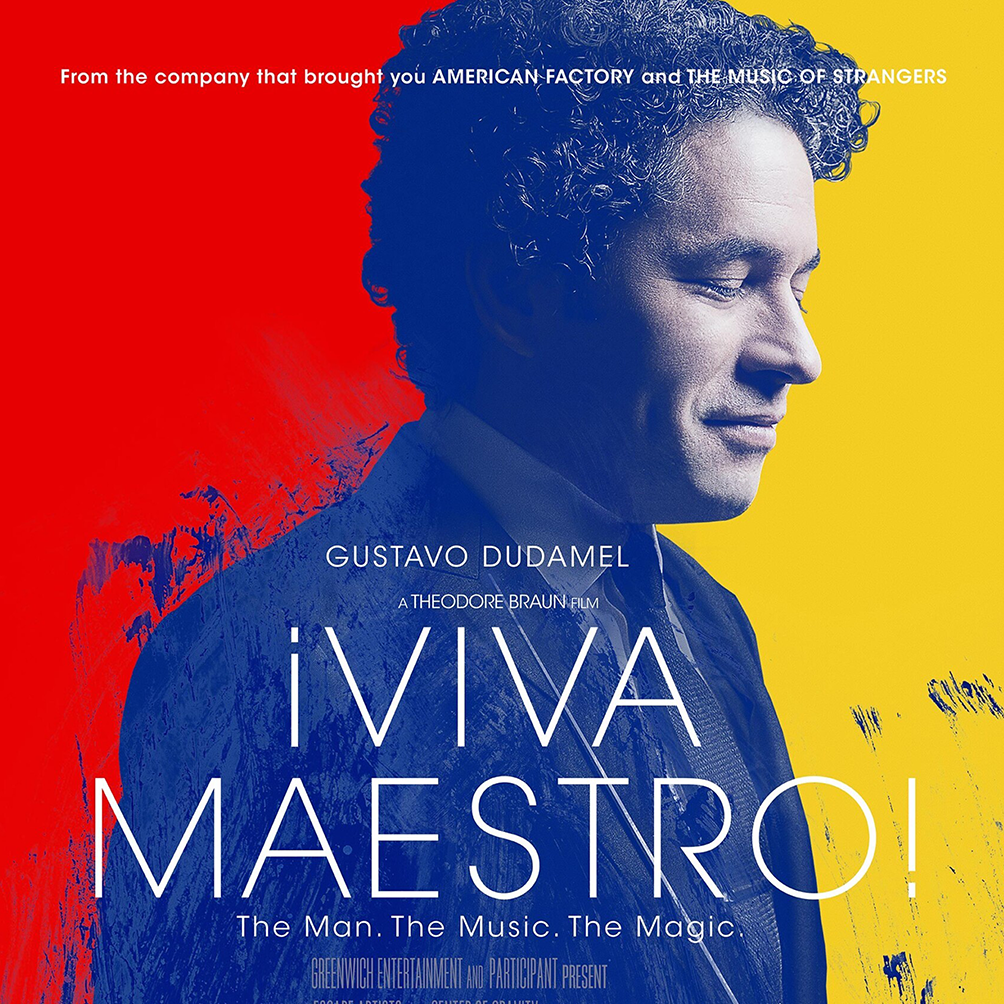
¡VIVA MAESTRO! The Man. The Music. The Magic.
When conductor Gustavo Dudamel’s international tours are disrupted by deadly protests across his native Venezuela, one of the world’s greatest and most beloved musicians faces the challenge of a lifetime —one that will deepen his commitment to the mentor who changed his life, upend relationships with friends and musicians he’s led since his teens, and test his belief in art’s transformative capacity. ¡VIVA MAESTRO!, the uplifting and timely new documentary from acclaimed director Ted Braun, follows Dudamel around the world as he responds to these unexpected and daunting obstacles with powerful music-making and an innovative and triumphant concert that celebrates the power of art to renew and unite.
Tuesday, April 26, 2022 | 01:00 pm
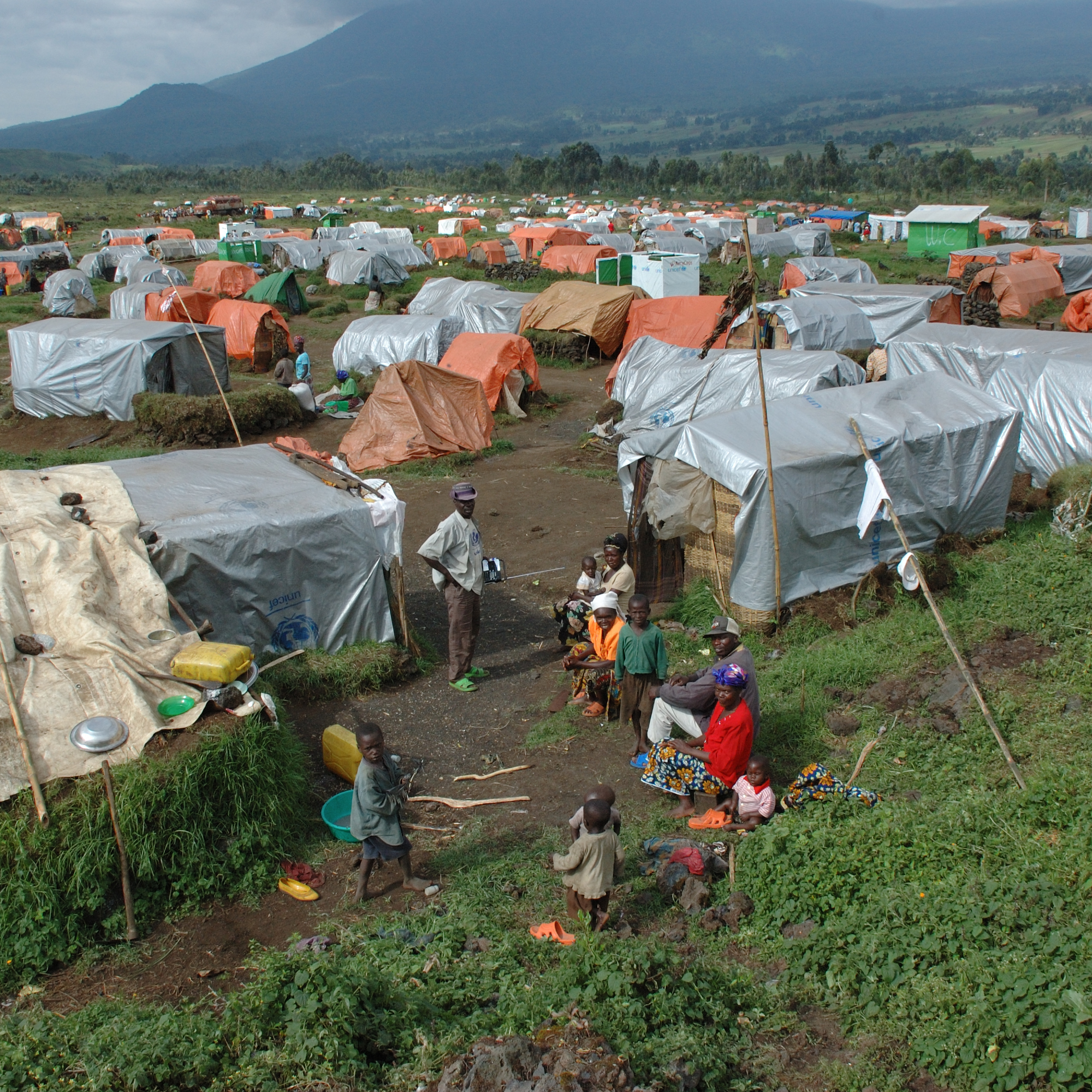
Working with Refugees
This event will be a discussion with people who are currently working with refugees around the world in various capacities including on the ground on a daily basis, as a representative of the U.S. Government and as part of the UNM community. Kayra Martínez, founder of Love Without Borders for Refugees in Need, will be speaking about the work the organization is doing to help Ukrainian refugees. Danielle Parker, Community Research Specialist at UNM Refugee and Immigrant Well-Being Project (RIWP) will address how students can gain skills to work with refugees and become involved.
Tuesday, April 26, 2022 | 02:00 pm
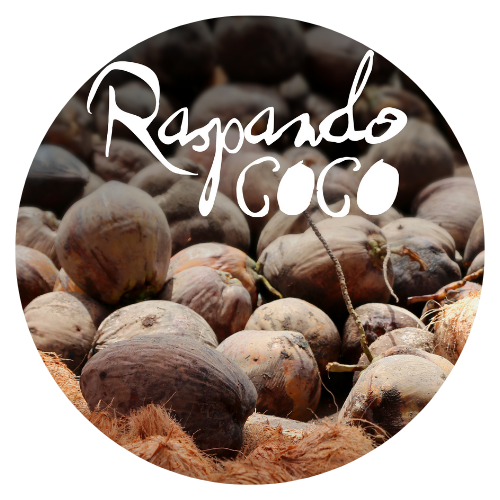
Raspando Coco Screening and Director Discussion
Pilar Egüez Guevara
Raspando coco is an award-winning film about the culinary and medicinal traditions of Afro-Ecuadorians. Since its premiere in 2018, it has been screened in three different languages to audiences in Latin America, the United States, Europe and Japan. The film documents the health impacts and culinary traditions surrounding coconut as remembered and experienced by Afro-Ecuadorians in the coast of Ecuador. The movie positions communities of color as important knowledge bearers about health and food and shows the tensions that can arise when development and public health authorities label staple foods, like coconuts, unhealthy. The film would connect with students and faculty interested in food justice and sovereignty, race and racism, Afro-Latin America, oral history and ethnography, public and community health, and sustainable development and agriculture.
Pilar Egüez Guevara, PhD is an Ecuadorian cultural anthropologist, writer and filmmaker. She holds a PhD in cultural anthropology from the University of Illinois at Urbana Champaign. She has worked directly with communities for over 15 years on research and community-based projects in Argentina, Cuba, Ecuador, and the United States. Her most recent work has focused on amplifying the voices of older women and men who are the bearers of traditional knowledge about food and medicine in the coast of Ecuador. In 2012, she co-founded and currently directs Comidas que Curan, an independent food and media company dedicated to research and promote traditional foods and knowledge through ethnography and film. She most recently directed and produced Raspando coco (Scraping Coconuts) an award-winning documentary about the culinary and medicinal traditions of Afro-Ecuadorians, which has been screened to audiences in the Americas, Europe and Asia. She is a published author, and speaks internationally in educational and community settings about the intersections of food, culture, conflict and health. She most recently taught «Cooking for a strong immune system» an online course taught to 800 community members across three different continents, in partnership with the Seed Savers’ Network of Ecuador. She is also a certified conflict mediator and coach.
Thursday, April 28, 2022 | 01:30 pm
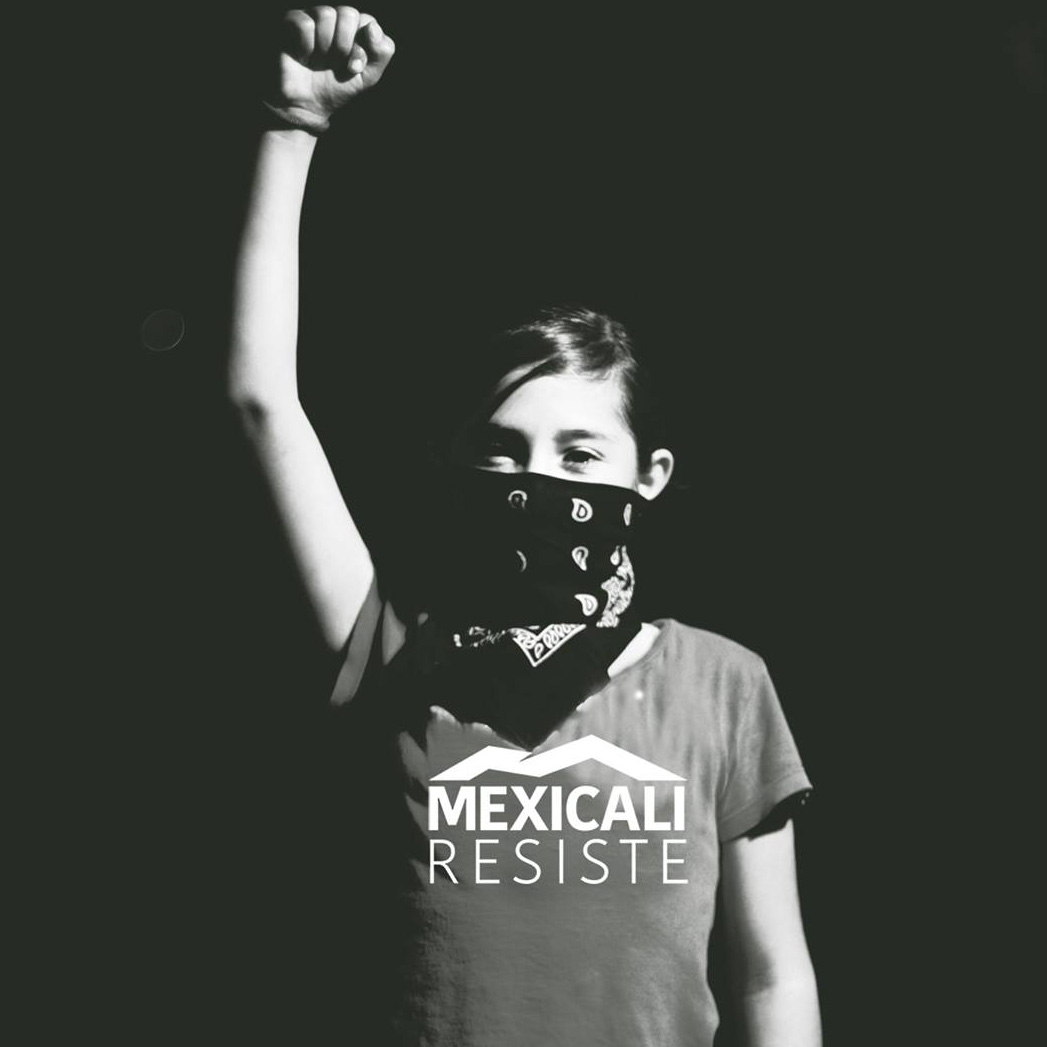
We Are Fingers of a Hand That Make a Fist: Working Class Alliances in Colorado River Water Protests in the Mexicali Valley, Mexico
Benjamin Warner , UNM
This talk explores recent water protests across northern Mexico which emanated from the Mexicali Valley in Baja California, Mexico. Beginning in 2015, communal farmers and industrial laborers, among other groups, aligned under the banner of Defense of Water to protest the construction of a United States-based beverage production facility. Through interviews, participant observation and archival research, I study this social movement through a class-based, historical lens to show how the meaning of water presupposes and represents a century of class politics that has allowed seemingly disparate groups to find meaning and build alliances within it. It is this history that has allowed protesters to achieve shared goals.
Thursday, April 28, 2022 | 04:30 pm

Teaching COP26 and Indigenous Activism in the Classroom
The University of New Mexico’s Latin American & Iberian Institute (LAII) will be hosting a free professional development workshop for educators to explore the United Nations Framework Convention on Climate Change Convention of Parties (COP26).
Lesson plans on COP26 include activities that explain the COP (What is it? What happened? Why is it important?) and a stimulated conference/debate activity mirroring the COP process. Additionally, a media literacy lesson plan will be presented preparing students to critically analyze content featured in the media, focusing on COP26 and Indigenous climate activism.
This workshop connects to the broader theme of this spring semester by centering Indigenous voices, experiences, power, and activism as it pertains to climate justice and provides educators with pertinent resources to approach the topic of COP26 which have the potential to stimulate students to think about climate globally and realize their potential to protect our planet.
The resources presented at this workshop are targeted at high school students but can be applied to all classrooms with adaptation.
Friday, April 29, 2022 | 02:00 pm
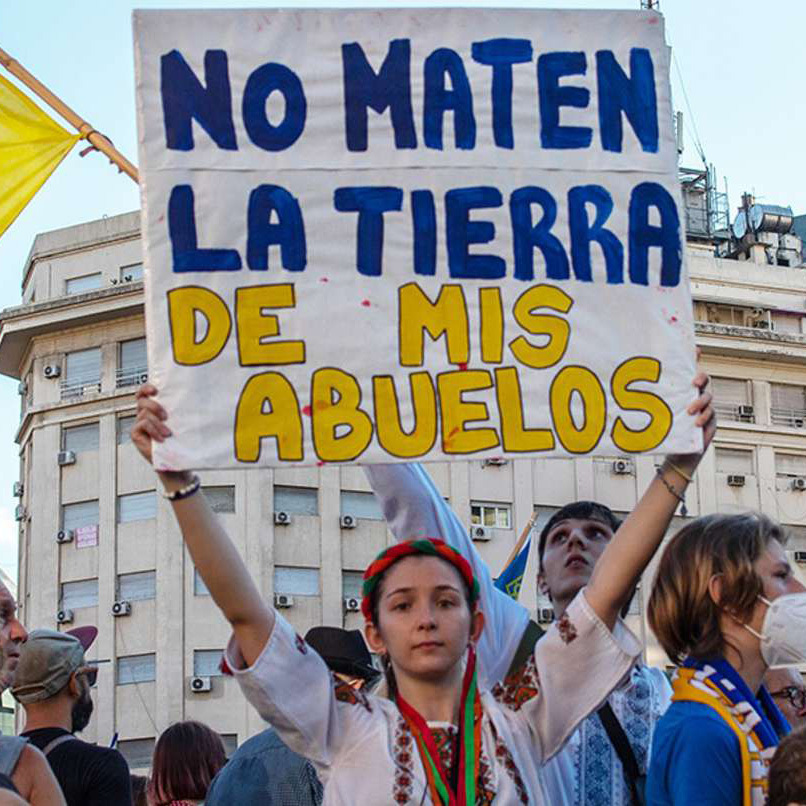
The Effects of the Russian War in Ukraine on Latin America
Adhemar Mineiro, Carlos Pabón Ortega, Francisco R. Rodríguez, Lenny Ureña Valerio
This event will address some of the main effects that the war in Ukraine is having on Latin American countries. By focusing on Brazil, Puerto Rico, and Venezuela, the speakers will share their insights on the political, cultural, and
economic consequences of the war. Adhemar Mineiro will approach the topic from the agricultural sector in Brazil, Carlos Pabón Ortega from the perspective of the political left in Puerto Rico, and Francisco R. Rodríguez from the view of oil markets and US-Venezuelan relations.
May
Tuesday, May 10, 2022 | 02:00 pm
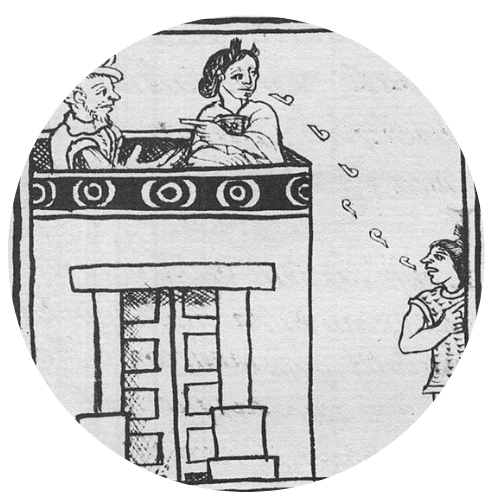
The Heirs of Malintzin: Gendered Hierarchies in the “Spiritual Conquest” of Sinaloa
Jason Dyck , University of Western Ontario
After his death in 1594, Jesuits hailed Gonzalo de Tapia as a proto-martyr of their missions in northwestern New Spain. They did not do the same for María, Tapia’s Indigenous translator who died together with him on the same day in Tovoropa. In this talk, I offer a reconstruction of María’s life by piecing together references to her in Jesuit letters, anuas, relations, and manuscript histories. Questioning the gendered hierarchies of mission histories, I argue that María’s life highlights the important yet often overlooked roles Indigenous women played as lay missionaries in the evangelization of Sinaloa in the late sixteenth and early seventeenth centuries.
Jason Dyck is a historian of the early modern Spanish world and a Teaching and Learning Librarian at the University of Western Ontario. His research focuses on religion, missionary work, sacred history, and Jesuit historiography in colonial Latin America.
Image Source: Bernardino de Sahagún et al, Malinche Translating from Palace Roof Top in Florentine Codex, 1570-1585, Biblioteca Medicea Laurenziana, Italy.
Friday, May 13, 2022 | 01:30 pm
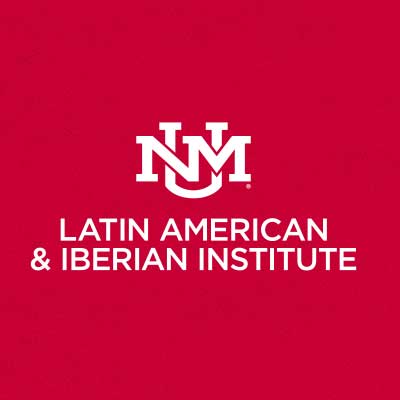
Spring 2022 LAS Convocation Ceremony
The convocation is a departmental event that is held in addition to the University-sponsored commencement. At convocation, each graduating student will be recognized, given a few minutes to say a few words about their time in the program, and will receive a certificate from the LAS program. The event concludes with a reception. This year's keynote speaker will be Dr. Luis Herran Avila, UNM Assistant Professor of History and this year’s recipient of the LAS Outstanding Faculty Award.
August
Thursday, August 25, 2022 | 05:30 pm

Looking for History
Margaret Randall
Margaret Randall is a poet, essayist, oral historian, translator, photographer and social activist. Her life and consequently her writings focus on themes of women’s political activism, social revolution, art, feminism, cross-cultural relationships, and lesbianism. Most of Randall's writings focus on Latin America and the United States. The years she spent in Mexico, Cuba, and Nicaragua figure prominently in her works. Randall uses mediums of photography, oral history, poetry, essay, translation, and narrative to bring her issues to light.
September
Thursday, September 08, 2022 | 04:00 pm
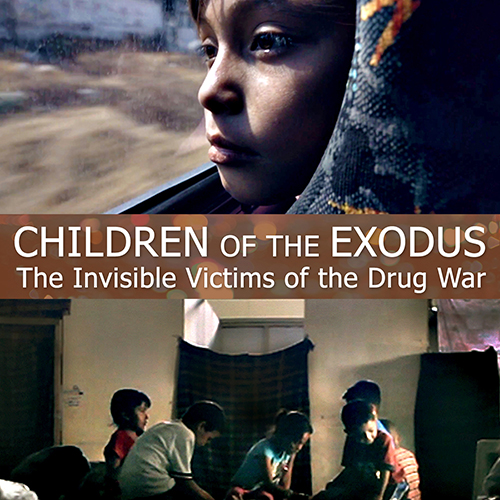
Children of the Exodus Discussion
Kimberly Gauderman and Rebecca Kitson
Join us for a discussion with filmmaker, Wilma Gómez Luengo, on her latest production: Los niños
del éxodo (Children of the Exodus: The Invisible Victims of the Drug War). This event will include
the participation of Aída Silva Hernández (Universidad Autónoma de Baja California and El Colegio
Frontera del Norte), Kimberly Gauderman (UNM History), and Rebecca Kitson (UNM Law School). Please
note that we will be holding this event in Spanish and English.
Thursday, September 15, 2022 | 03:00 pm
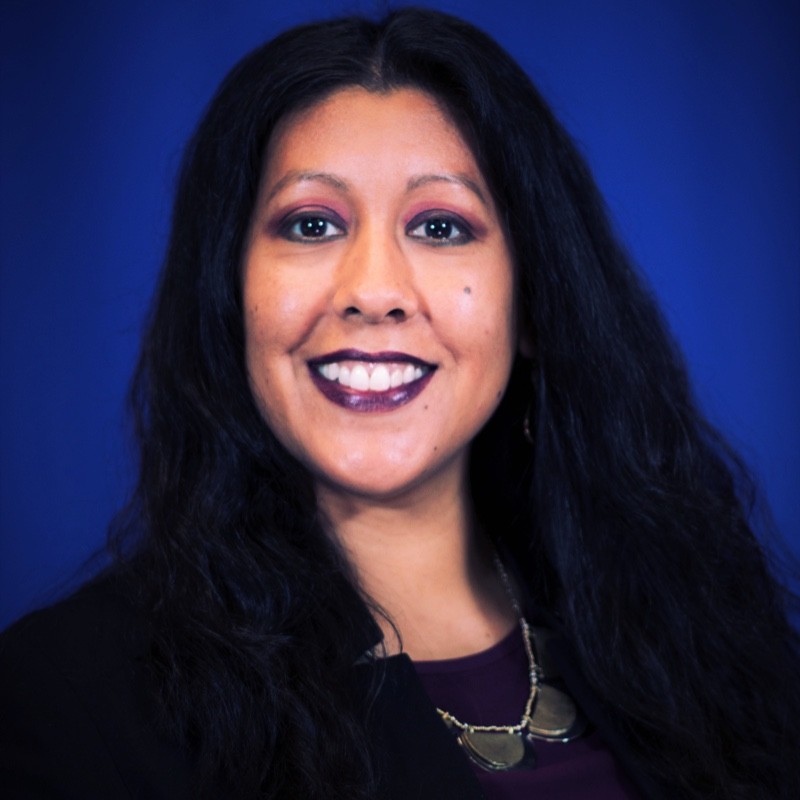
Apply Your Skills to a Career in Diplomacy: Meet UNM Diplomat in Residence Antoinette Hurtado
Antoinette Hurtado
Are you interested in a career with global impact and adventure? Do you want to travel the world, learn new languages, and work on the most pressing international issues of the day? U.S. Department of State Diplomat in Residence for the southwest, Antoinette Hurtado, will visit UNM's campus to talk about State Department careers and student programs (internships, fellowships, study abroad scholarships) and share her story as a U.S. diplomat. Join the session to learn more and see if this might be the right path for you!
Thursday, September 15, 2022 | 03:00 pm

Food, Security, and Sustainability: "Soil, Struggle and Justice: Agroecology In The Brazilian Landless Movement"
Andreas Hernandez , UNM Sustainability Studies
This film examines a cooperative of the Brazilian Landless Movement (MST) in the South of Brazil, which struggled for access to land and then transitioned to ecological agriculture, or agroecology. This MST cooperative is demonstrating the possibility of an alternative model of flourishing rural life, which provides thriving livelihoods for farmers, produces high quality and low cost food for the region, and rehabilitates the earth. Introduction by Andreas Hernandez, Ph.D. Dr. Hernandez will moderate a discussion immediately following the screening.
Saturday, September 24, 2022 | 12:00 pm

LAII K-12 Resources Information Session
Join the LAII K-12 Educator Outreach team as we provide an overview of our various resources and services we offer to educators. Attendees will be entered into a raffle for an Office Depot gift card.
Tuesday, September 27, 2022 | 04:00 pm

What Was the FARC? The Colombian Guerrilla Dystopia 1948-2016
Les W. Field, Department of Anthropology, UNM in conversation with Felix Manuel Burgos, Department of Spanish and Portuguese, NYU
Media and often academic discourse about guerrilla movements in the 20th and 21st centuries typically flattens what are substantive differences between extremely diverse armed social movements. That diversity is present not only between the armed movements of Latin American and those of the Middle East, for example and perhaps most obviously, but within Latin America itself post World War II. US academic perspectives on Latin American guerrilla movements have been and in many ways continue to be shaped by Central American nationalist, anti-imperialist armed organizations such as the FSLN (Nicaragua), the FMLN (El Salvador) and the URNG (Guatemala), or by the leftist nationalist guerrillas of the Southern Cone, such as the Tupamaros (Uruguay) or the Montoneros (Argentina). Colombia’s FARC, which was founded in 1964 but was impelled by a chain of events that exploded in 1948 stands in substantive and stark contrast to any of these other guerrilla movements. The history of the FARC which as it had been configured since its founding came to an end in 2016 offers a window into a movement shaped by an oligarchic society, inspired by Stalinist interpretations of Marxism, and marked by a profoundly dystopian trauma at its very start.
Thursday, September 29, 2022 | 02:00 pm
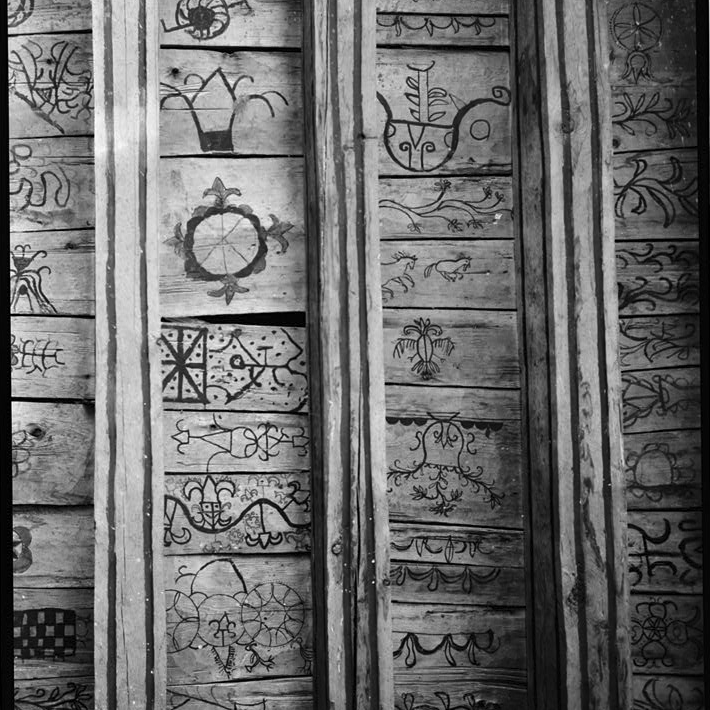
Native Mesoamerican Settlers of Colonial New Mexico: Identity, Memory, Forgetting
Danna Levin Rojo , Universidad Autónoma Metropolitana-Azcapotzalco
Scholars have long debated the participation of Tlaxcalan Natives in the Spanish conquest and colonization of New Mexico, based on evidence concerning the Barrio de Analco de San Miguel, in Santa Fe, supposedly established by Tlaxcalan allies in 1609-1610. This presentation will discuss the possible presence of Otomís and other Mesoamerican Natives as frontier settlers in 17th to 18th century New Mexico, and the traces they may have left in the cultural heritage of several Indo-Hispano communities located north of Santa Fe. A piece of possibly important evidence for this hypothesis is the set of drawings that decorate the underside of the choir-loft of the chapel of San José de Gracia de las Trampas, which contain designs that resemble closely certain symbols typical of the Otomí syncretic Christian iconography used in 17th and 18th century chapels in the Mexican states of Hidalgo and Querétaro. Because colonial documents rarely recorded the provenance and ethnicities of non-Spanish members of colonizing parties, Otomí presence is very difficult to demonstrate. However, my research has explored other sorts of indirect evidence that I will present, together with a general reflection on what indigenous groups, local or Mexican, are generally considered part of the New Mexico Hispano cultural heritage, why some of them –like the tlaxcallans– are acknowledged and others are not.
Wednesday, November 02, 2022 | 04:00 pm
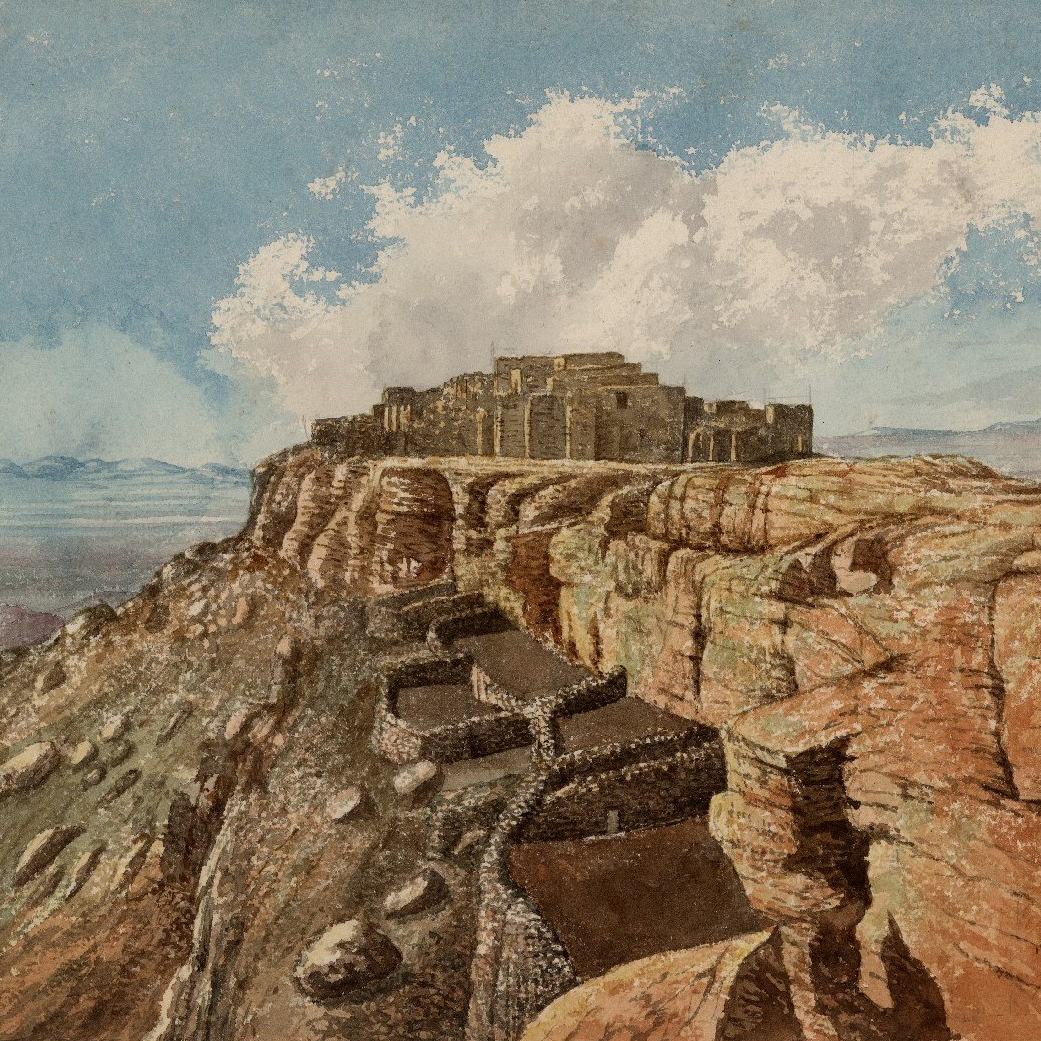
Indigenous Borderlands in North America Symposium
This symposium seeks to develop new borderland and border-crossing approaches to continental North America that center Indigenous peoples, homelands, political concerns, and related dynamics – temporally and spatially expanding borderlands frameworks.
October
Tuesday, October 11, 2022 | 05:00 pm - 07:00 pm

An Evening for Educators Día de los Muertos
Spend a lively evening exploring Día de los Muertos celebrations, arts, and history at the National Hispanic Cultural Center. Take back hands-on activities for your students that will give them a better understanding of this important cultural holiday. This is a free event for educators. Register at nhccnm.org
Thursday, October 13, 2022 | 02:00 pm
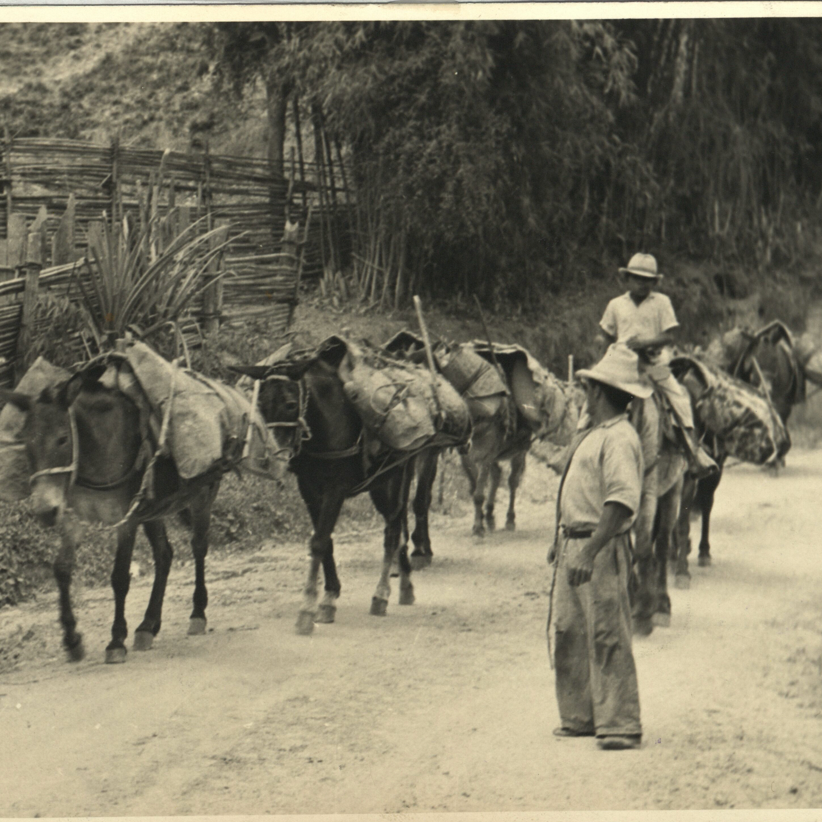
North-South Encounters: the Inter-American beginnings of community development programs
Thiago Lopes , Richard E. Greenleaf Visiting Library Scholar
In this presentation, Thiago Lopes will discuss some of the findings of his postdoctoral research project on the history of social-scientific exchanges and rural development policies in the Americas in the 1940s. Drawing on his recent research experience at the Center for Southwest Research/University of New Mexico, he will focus on the role played by U.S. rural sociologist T. Lynn Smith in the agricultural cooperation policies of the Roosevelt Administration for the Americas. Smith’s diplomatic and scientific missions to South America, allowing him to engage in meaningful intellectual dialogues with Latin American thinkers such as the Brazilian writer Oliveira Vianna, were a key factor in his own reformist efforts of strengthening communitarian forms of life amid the negative effects of capitalist development in the countryside. According to Thiago Lopes, Smith’s work gives us an opportunity to reexamine traditional narratives in Scientific and Intellectual History concerning the flow of ideas and developmental models from the Global North to the Global South while also inviting us to investigate theoretical and methodological ways of addressing power asymmetries in the global production/circulation of knowledge.
Thursday, October 20, 2022 | 03:30 pm
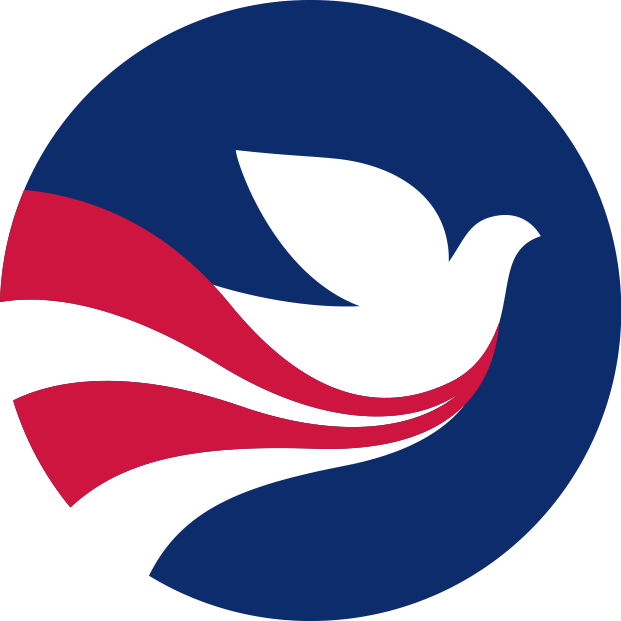
Peace Corps Info Session
David Abundis , Peace Cops Recruiter
Serving in the Peace Corps is a great way to immerse yourself in a new culture, learn a new language, and have the experience of a lifetime. Join us at this information session to learn about Volunteer experiences, ask questions about service, and gain tips to guide you through the application process.
Thursday, October 20, 2022 | 04:00 pm

Remembering in Community: A Chat with Ofelia Esparza & Rosanna Esparza Ahrens
Award-winning Chicana artist and educator doña Ofelia Esparza has been creating Day of the Dead altars for decades. She has been covered by the LA Times, awarded by the National Endowment for the Arts (NEA) as a National Heritage Fellow, and has received the prestigious United States Artist fellowship. Her daughter Rosanna Esparza Ahrens is a Chicana artist with 15 years experience in graphic design and production art. Rosanna, along with her mother and other community members of East Los Angeles, is a co-founder of the creative wellness center, Tonalli Studio. This venue is the first female-owned wellness/art space in East Los Angeles. Together, Ofelia and Rosanna are widely recognized for sharing with the public the healing power of commemoration in many diverse spaces. For instance, both currently teach prisoners through altar-making, as part of the Arts in Corrections program of the non-profit organization, Alliance for California Traditional Arts.
Thursday, October 27, 2022 | 02:00 pm

The Field Research Grant Colloquium
LAII Field Research Grants provide graduate students with the ability to conduct pilot studies and preliminary investigations in Latin America. Join us for presentations from the grant recipients. FOR MORE INFORMATION: http://laii.unm.edu/funding/student-field-research-grants.html
Thursday, October 27, 2022 | 05:30 pm

Distringuished Feminist Research Award, Lecture & Reception
Bernadine Hernández
The Feminist Research Institute at the University of New Mexico invites you to attend the 5th Annual Distinguished Feminist Research Lecture. This year’s recipient of this award is Dr. Bernadine M. Hernández, associate professor in the Department of English Language & Literature. Since 2016, the Feminist Research Institute has recognized a UNM faculty member whose scholarly record of research and publication embody and reflect the mission of the Feminist Research Institute. Dr. Bernadine Marie Hernández’s scholarly profile, teaching and community activism demonstrate her commitment to women of color feminisms and advances an understanding of gender as necessarily linked to race, sexuality, and other social formations. The Feminist Research Institute is thrilled to honor Dr. Hernández’s achievements and invites the UNM campus community and beyond to learn about her recently published book, Border Bodies: Racialized Sexuality, Sexual Capital, and Violence in the Nineteenth-Century Borderlands (University of North Carolina Press, 2022).
The event will feature a lecture given by Dr. Hernández on her recent book, Border Bodies: Racialized Sexuality, Sexual Capital, and Violence in the Nineteenth-Century Borderlands (University of North Carolina Press, 2022). There will be copies of the book available for purchase with a book-signing immediately following the lecture. We also invite guests to a reception at Draft & Table in the SUB.
Thursday, October 27, 2022 | 06:00 pm
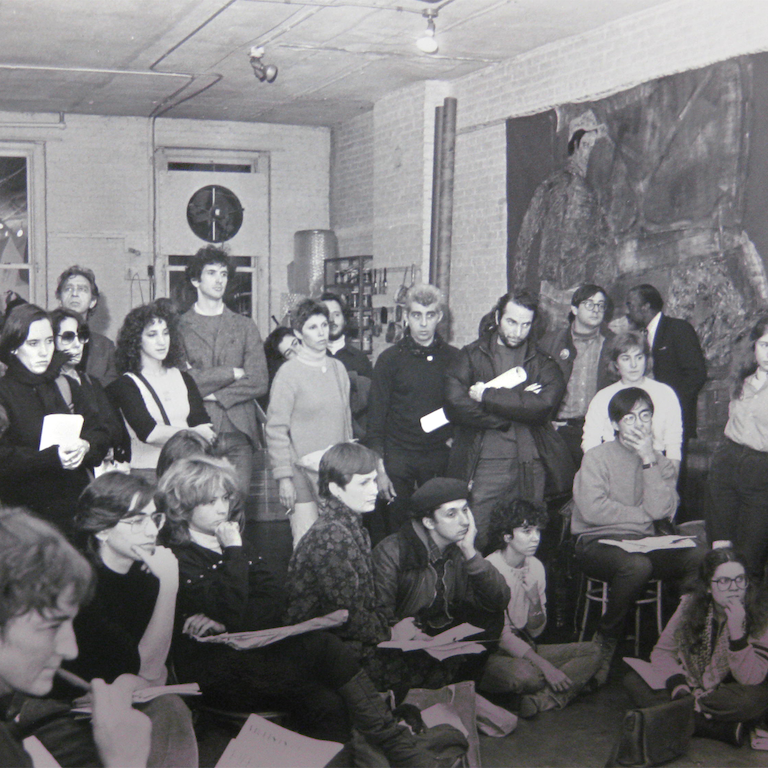
Called To Action: A Panel Discussion with The Founders of Artists Call
Please join us for a lively discussion with the founders of Artists Call. In this historic and unprecedented conversation, the founders will discuss how the movement formed, its successes and failures, what it meant to organize against the US government in solidarity with Central Americans in the mid-1980s, as well as what the exhibition, Art for the Future, indicates about art and activism now.
The panel includes the venerable New Mexican art critic, historian, and activist Lucy Lippard; Salvadoran poet and filmmaker Daniel Flores y Ascencio; as well as artist and educator Douglas Ashford, Professor of Art at The Cooper Union.
The conversation will be led by Abigail Satinsky, co-curator of Art for the Future: Artists Call and Central American Solidarities.
Major support for this event was provided by the Allene H. and Walter P. Kleweno Lecture Series Fund, with additional support from The University of New Mexico Department of Art’s Gale Memorial Lecture Series, and the Latin American & Iberian Institute at UNM.
Friday, October 28, 2022 | 12:00 pm

LAII and CCS Día de los Muertos Open House
Come and learn about academic offerings, funding, and other resources offered to students through UNM CCS and the LAII as we celebrate Dia de Los Muertos by honoring our ancestors and traditions. Join us for the Dia de Los Muertos fun activities we have prepared and learn about the traditions! Hot beverages and snacks will be served!
Friday, October 28, 2022 | 03:00 pm
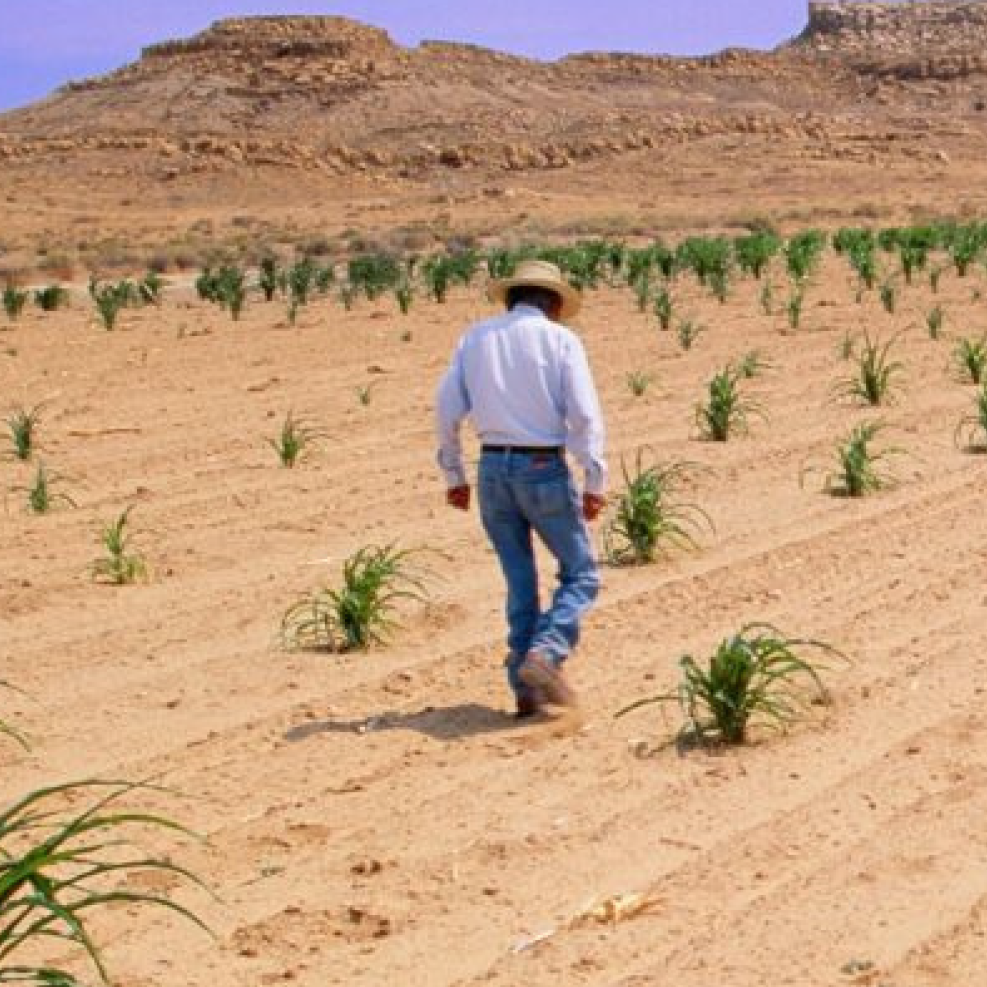
Climate Friendly Agriculture in The Face of Water Scarcity
Dr. Gary P. Nabhan
A renowned agricultural ecologist and ethnobotanist, Dr. Gary Nabhan is considered a pioneer in the local
food movement. Dr. Nabhan of the University of Arizona's Southwest Center will examine sustainable
food systems amid worsening water scarcity. His talk will be followed by a Q & A session and discussion.
Monday, October 31, 2022 | 02:00 pm
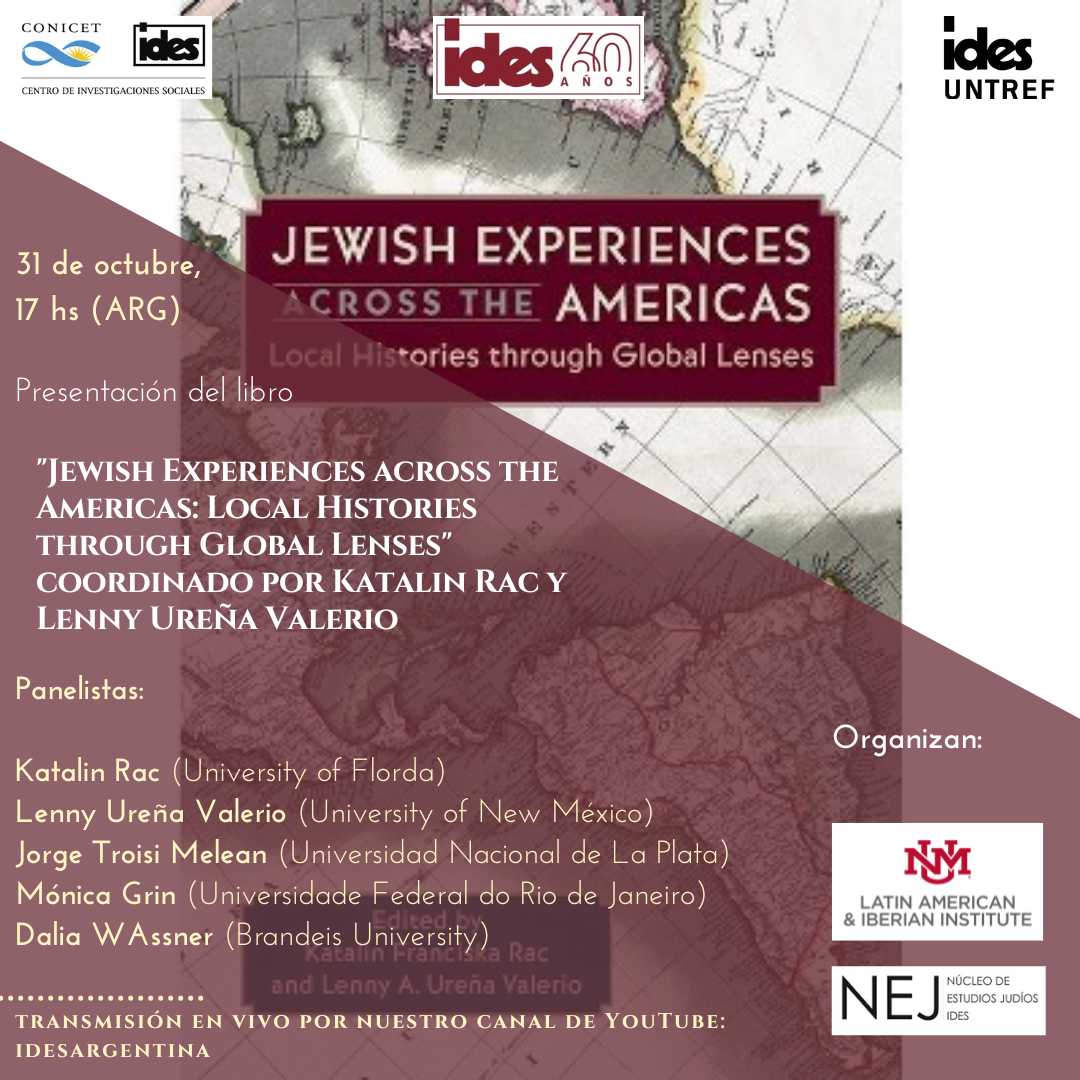
Saturday, November 05, 2022 | 02:00 pm - 04:00 pm
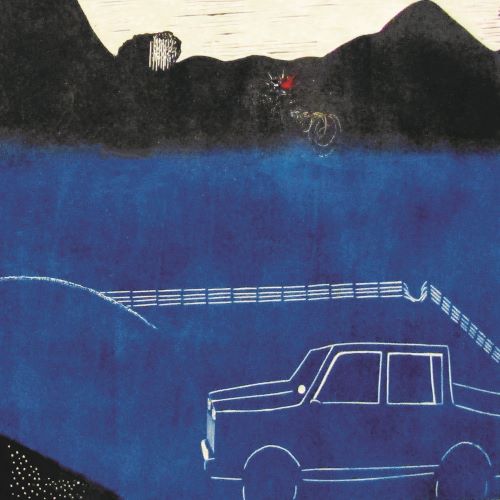
K-12 Educators Workshop: Reimagining the U.S.-Mexico Border
In this hands-on workshop, educators will learn how to incorporate the concepts of Latinx Futurisms, imagination, and the reality of the US- Mexíco border into their classroom teaching. Curricula and hands-on activities will be offered using the art of the current 516 ARTS’ exhibitions MIGRATORY and When The Dogs Stop Barking as an inspiration. All participants will receive a resource guide on these topics after the workshop.
November
Thursday, November 10, 2022 | 02:00 pm

Maya Language Use Today: A Two-part Panel on Contemporary Research on the Maya Language
Dr. Barbara Blaha D. Pfeiler; Dr. Jaime I. Chi Pech
Tuesday, November 15, 2022 | 12:00 pm

Lo que logra "El Feliz Ingenio Neomexicano": Felipe M. Chacón and Poesía y prosa
Anna M. Nogar and Gabriel Meléndez
El feliz ingenio neomexicano (UNM Press 2021) is a bilingual recovery edition of Obras de Felipe Maximiliano Chacón, el Cantor Neomexicano: Poesía y prosa, the first collection of poetry published by a Mexican American author. Journalist and author Felipe M. Chacón, part of a distinguished and active family of nuevomexicano authors, published the book in Albuquerque in 1924, on the presses of the bilingual newspaper La bandera americana. El feliz ingenio neomexicano (that “inspired New Mexican wit”) reestablishes Chacón’s work and his reputation by making the text widely available to readers for the first time in nearly a century. In this talk, Dr. Anna M. Nogar and Dr. A Gabriel Meléndez discuss the enduring legacy of Felipe M. Chacón's deeply bilingual writing, created and shared during New Mexico's fraught 19th and early 20th centuries.
Anna M. Nogar is Professor in the University of New Mexico’s Department of Spanish and Portuguese. She is the author, editor, and coeditor of several books, including Quill and Cross in the Borderlands: Sor María de Ágreda and the Lady in Blue, 1628 to the Present; A History of Mexican Literature; and Sisters in Blue: Sor María de Ágreda Comes to New Mexico / Hermanas de Azul: Sor María de Ágreda viene a Nuevo México (UNM Press).
A. Gabriel Meléndez is a Distinguished University Professor and the former director of the Center for Regional Studies at the University of New Mexico. Meléndez is the author, editor, and coeditor of numerous books, including The Book of Archives and Other Stories from the Mora Valley, New Mexico; Santa Fe Nativa: A Collection of Nuevomexicano Writing (UNM Press); and The Writings of Eusebio Chacón (UNM Press).
Tuesday, November 15, 2022 | 02:00 pm
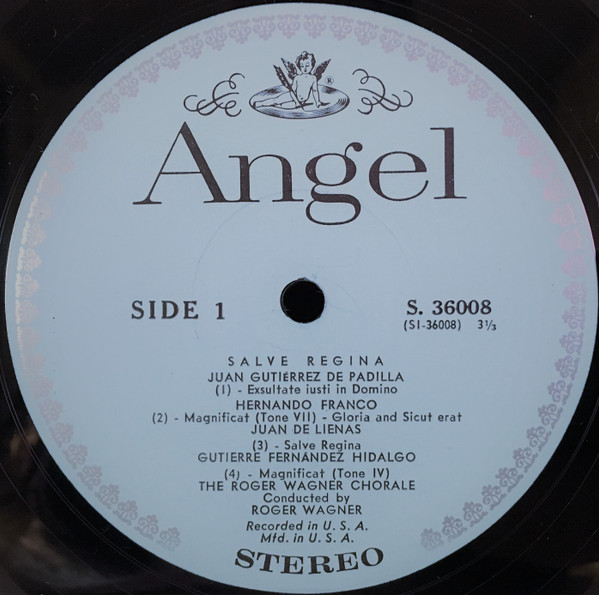
Latin American Colonial Music in Performance: A Critical Overview Through Sound Recordings
Dr. Javier Marín López , University of Jaén, Spain
In this session, Dr. Marín-López examines the discographic reception of Latin American colonial music by analyzing samples from different genres, mostly of sacred music, with diverse vocal and instrumental configurations. His talk considers the role recordings have had in the creation of communities and imagined identities by modern audiences.
Tuesday, November 15, 2022 | 03:00 pm

Boren Awards and Foreign Language and Area Studies (FLAS) Fellowships Info-Session
Boren Awards
-Boren Awards provide funds up to $25,000 to undergraduate students and up to $30,000 to
graduate students who study languages considered essential for U.S. national security by
the federal government, including Arabic, Hindi, Mandarin, Portuguese, Russian, and
Swahili.
-Fellows must commit to working in the U.S. federal government for at least one year.
Preferred candidates are those who have an interest in working in the federal
government long-term. Graduate applications are due January 25, 2023. Undergraduate
applications are due February 1, 2023.
Foreign Language and Area Studies (FLAS) Fellowships
-Summer and Academic Year (AY) FLAS Fellowships are awarded to undergraduate and
graduate students to study less-commonly taught languages, including Nahuatl,
Quechua, Portuguese, and Yucatec Maya, in combination with area-studies,
international studies or international aspects of professional studies. Funds are
provided by the Latin American and Iberian Institute (LAII) through a generous Title VI
grant from the U.S. Department of Education.
-The Summer FLAS Fellowship provides up to $5,000 in tuition and fees and a $2,500
stipend to both undergraduate and graduate students for intensive language training in
the U.S. or abroad. The AY FLAS Fellowship provides up to $18,000 in tuition and fees
and a $20,000 stipend to graduate students and up to $10,000 in tuition and fees and a
$5,000 stipend to undergraduate students to study at UNM or in a UNM-approved study
abroad program.
-Applications for both Summer 2023 and 2023-2024 AY FLAS competitions are due
February 22, 2023.
Wednesday, November 16, 2022 | 03:00 pm
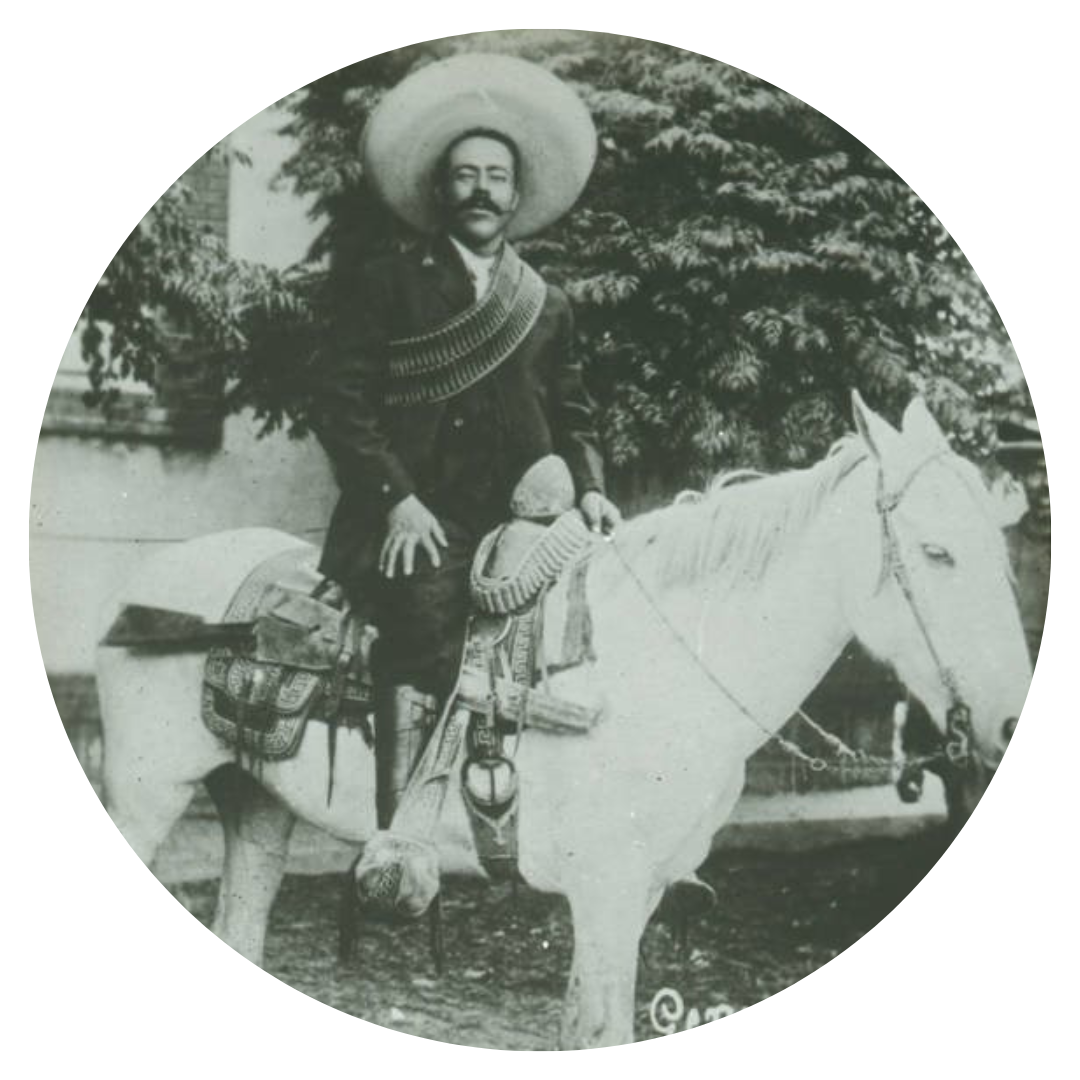
Death on the Other Side: The Mexican Revolution through the Lens of US Postcards Companies
Juan Leal Ugalde
The Mexican Revolution triggered a massive photographic production in which numerous US-based photo companies depicted gruesome scenes to commercialize them as postcards. Significantly, the intervention of the US Armed Forces during the Invasion of the Port of Veracruz in 1914 and the Punitive Expedition in 1916-17 against revolutionary leader “Pancho” Villa in Northern Mexico marked key events for the postcards’ business. In the following presentation, I will show, in the first place, the link between the deployment of the advanced military apparatus and the development of technological images in a crucial Latin American revolution. And, in the second place, I will problematize the visual memory of mass graves, executions, and unknown human remains through images attributed to the American Walter Horne and other postcards producers, observing these images beyond the racialized perspective that represented the “savage” violence in Mexico.
Thursday, November 17, 2022 | 02:00 pm
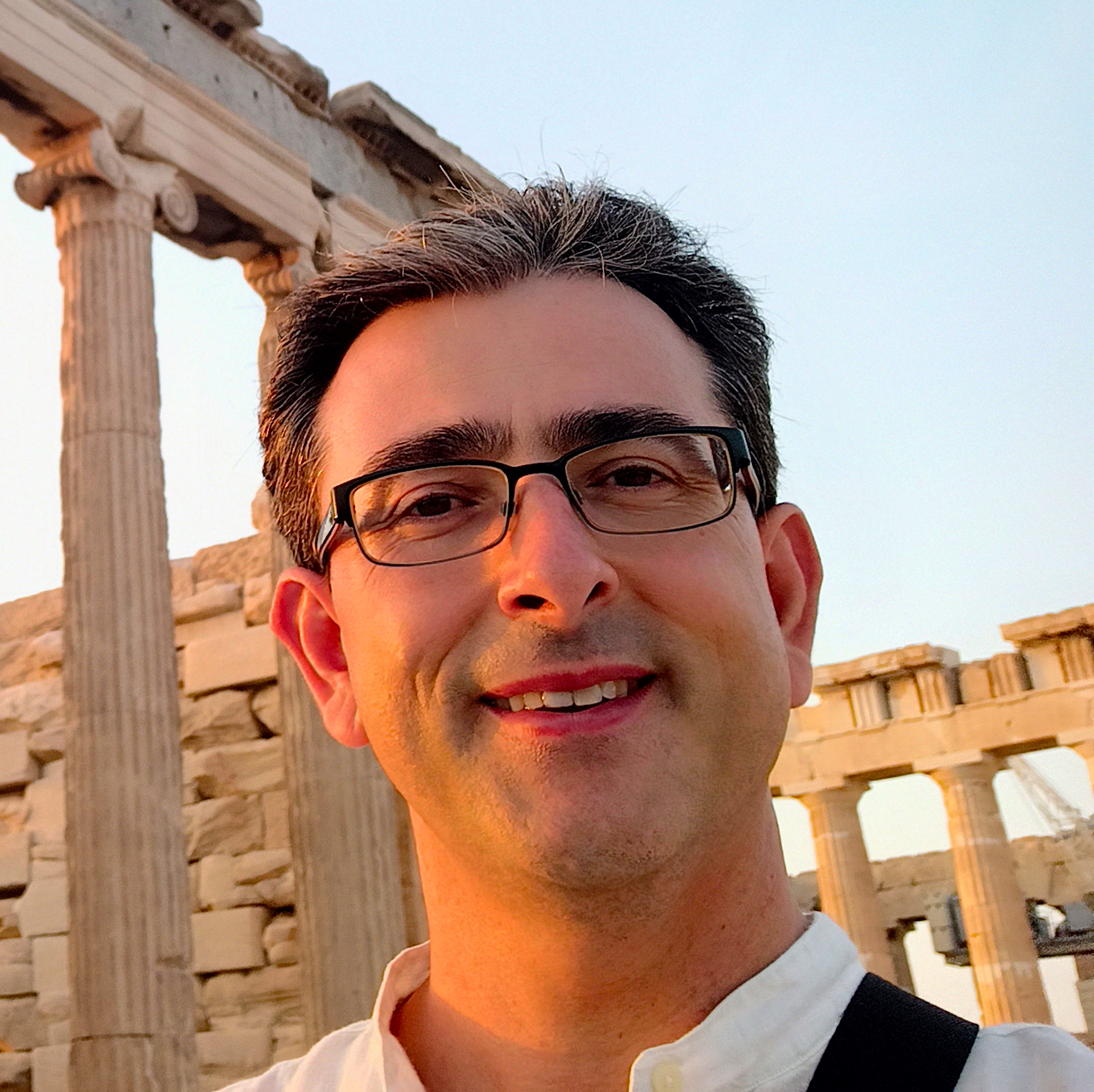
Creole Politics and Visual Culture in Baroque Mexico: Francisco López Capillas and a Transatlantic Music Manuscript
Dr. Javier Marín López , University of Jaén, Spain
Copied in Mexico City in the third quarter of the 17th century and sent to Spain at an unknown time, the manuscript Madrid, Biblioteca Nacional, M.2428 occupies a unique position in the universe of polyphony choirbooks produced in the New World. In addition to its status as a clearly ordered anthology with works by a single composer, Mexican-born Francisco López Capillas (1614-74), the most outstanding feature of this book is the quantity, quality, and artistic originality of its initials. The iconographic charge of these initials articulates a political agenda with implications beyond the music itself. Using the notion of cultural artifact and applying a multi-dimensional analysis, in this presentation Dr. Marín-López explores the discourses that emerge when interpreting the book as an act of symbolic communication of Creole agency.
Thursday, November 17, 2022 | 03:00 pm

LAII Field Research Grant Information Session
Please join us for an in-person information session about the LAII Field Research Grant. TheLAII Field Research Grant provides graduate or professional students the opportunity to conduct preliminary research in Latin America for their degree projects, as well as faculty the opportunity to begin fieldwork on new projects or add a comparative dimension to previous research. Restrictions apply.
Applications are due Wednesday, March 22, 2023.
Tuesday, November 29, 2022 | 02:00 pm
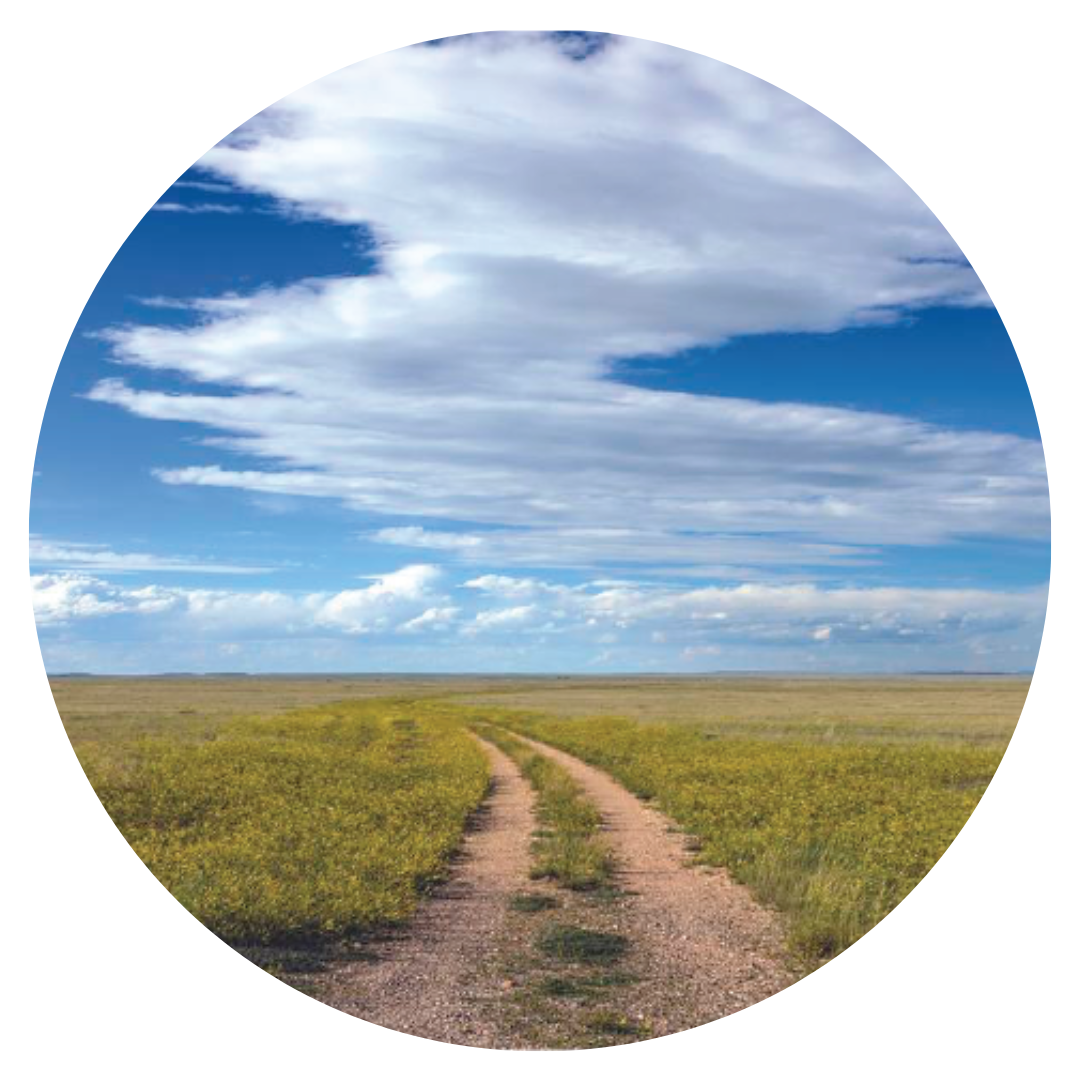
El Llano: The Making and Remaking of a Mexican Homeland on the Southwest-Great Plains Borderlands
Joel Zapata
The United States’ Mexican population has come to the forefront of public and academic exchanges amidst
the past two presidential campaigns and ensuing political debates regarding immigration policy and border
security. Yet, these discussions consistently neglect Mexicans’ long-term history in what is now the United
States, along with their enduring social influence throughout the nation. A prime example of this neglected
history is the ethnic Mexican past of the Southern Great Plains, a vast transregional grassland larger than
California that stretches from southeastern Colorado and southwestern Kansas, down across eastern New
Mexico and western Oklahoma to central Texas.
